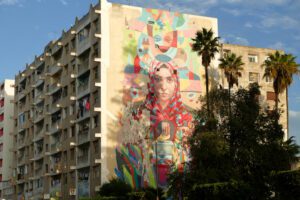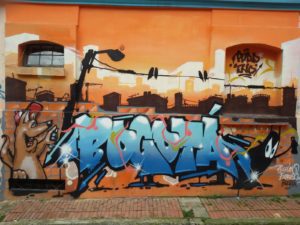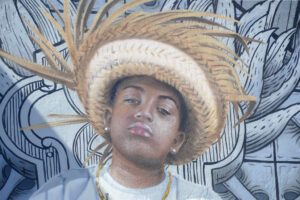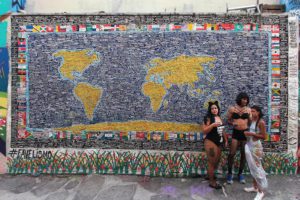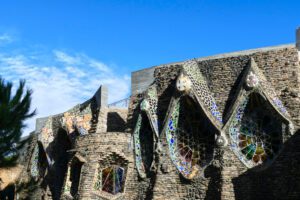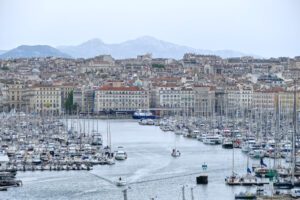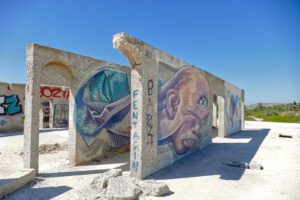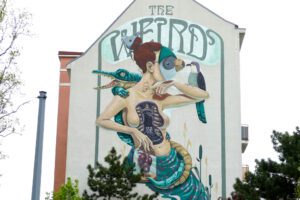Basically, all visitors are coming to Bonaire for the waters, for swimming and diving, and for snorkeling. And you cannot blame them, the smallest of the ABC islands is surrounded by some of the world’s best reefs. Getting into the water, you’re basically entering a borderless aquarium.
But come on, you water maniacs lovers, you don’t want to miss out on the best Bonaire has to offer ashore, do you? So quick, dry yourself off, put on some shorts and flip-flops, and let’s explore what Bonaire has in store when it comes to street food and urban art.
I promise you won’t regret it!

Bonaire
Bonaire is the easternmost of the three so-called A B C islands which are part of the Dutch Antilles off the coast of Venezuela.
The popular holiday destination Aruba is Bonaire’s little sister while Curaçao is the bigger and apparently more important one.
This makes Bonaire seemingly the oftentimes overseen middle child.
Very unjustly so since although it might be lesser known, B is still at least as beautiful and varied as its siblings A and C.
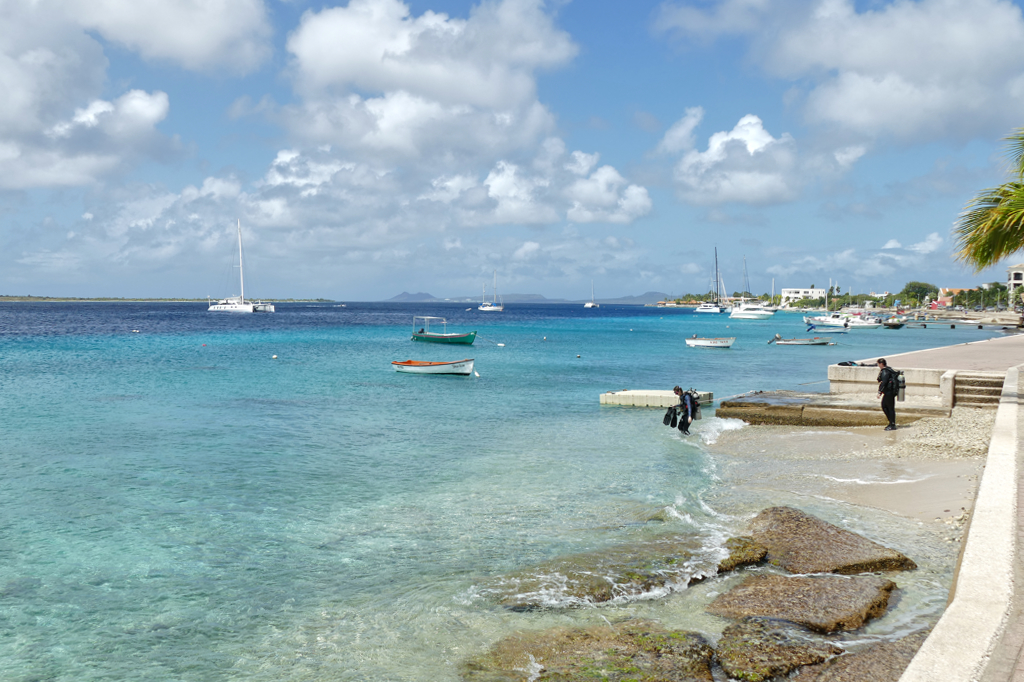
With an area of almost 290 square kilometers, Bonaire has a population of about 20,000 people and 10,000 flamingos. The island consists almost entirely of coral rock and is surrounded by reefs made up of about 60 different coral species. I have a printed map of Bonaire which shows no less than 63 designated diving spots. I’m pretty sure this is the reason why the island is mainly popular for activities underwater. However, don’t underestimate the wonderful things you can experience on the island without getting even your toes wet.
Murals of Bonaire
Although Bonaire is so small that you could drive around the entire island in one to two hours, there is an unexpected amount of street art there. And not only in the isle’s cute little capital called Kralendijk. No, you can find beautiful murals on beach walls, on shipping containers and site fences, as well as on houses in the middle of nowhere. An abandoned hotel building and the walls of a former shrimp factory have become fantastic open-air galleries over the years. And these works of art do not only come from internationally renowned artists. Art education is – in addition to serious nature conservation – crucial in Bonaire. Some of the works that I introduce in this post were made by school kids. If I hadn’t told you, you wouldn’t have noticed that there wasn’t a professional at work, I can tell you that.
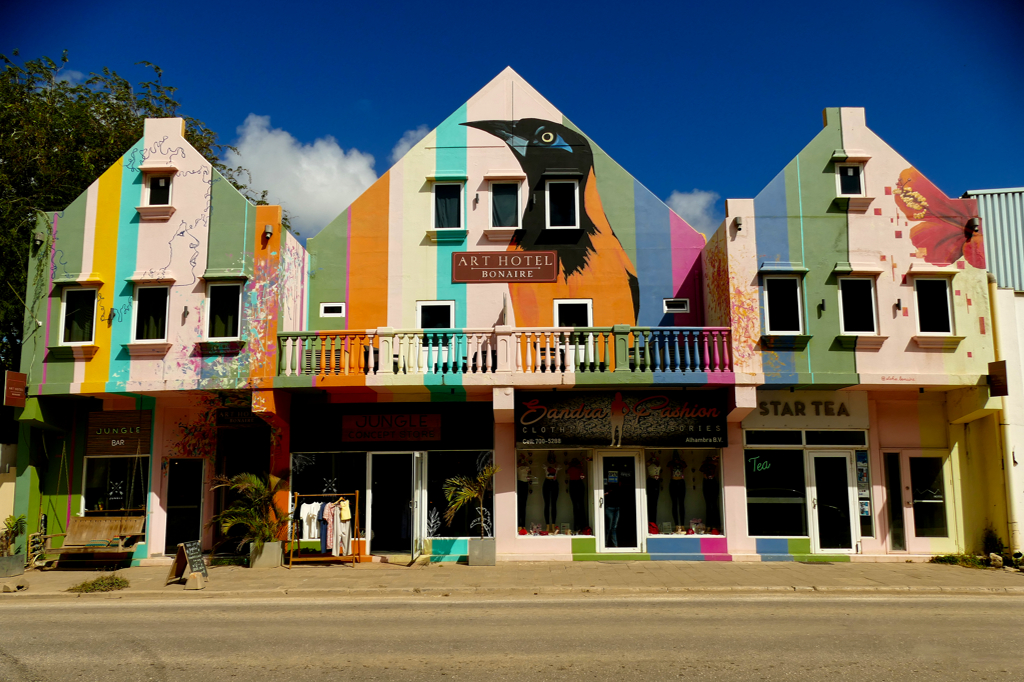
For instance, in the project called Street Colors Bonaire, youngsters work on their own murals together with professional artists. Also, students from the MBO vocational school participate in a course on street art. And all this is promoted by the Fundashon Plataforma Kultural, a local culture foundation.
So yes, art and urban art in particular are a huge deal in Bonaire.
Street Food And Urban Art Tour
“We are having this new activity,” says Karin, “don’t you want to try it out?” She’s helping me organize my trip to Bonaire “What is it?” “It’s a self-guided street food and street art tour.” I don’t need to know more. The keywords street and food and art convince me without any more context or further ado. “I’m stoked, count me in!”
So on a sunny Saturday morning, I sit across from Reinier who is installing an App on my phone and explaining the functions. “You can go according to the numbers on the map or you just pick the murals you want to see. If you get hungry or you need a break, you can just stop at one of the food trucks. On the map, you are the blue dot.” Fine, I’m used to being the blue dot on maps, I’ve been the blue dot on maps in many cities around the world. So what can possibly go wrong?
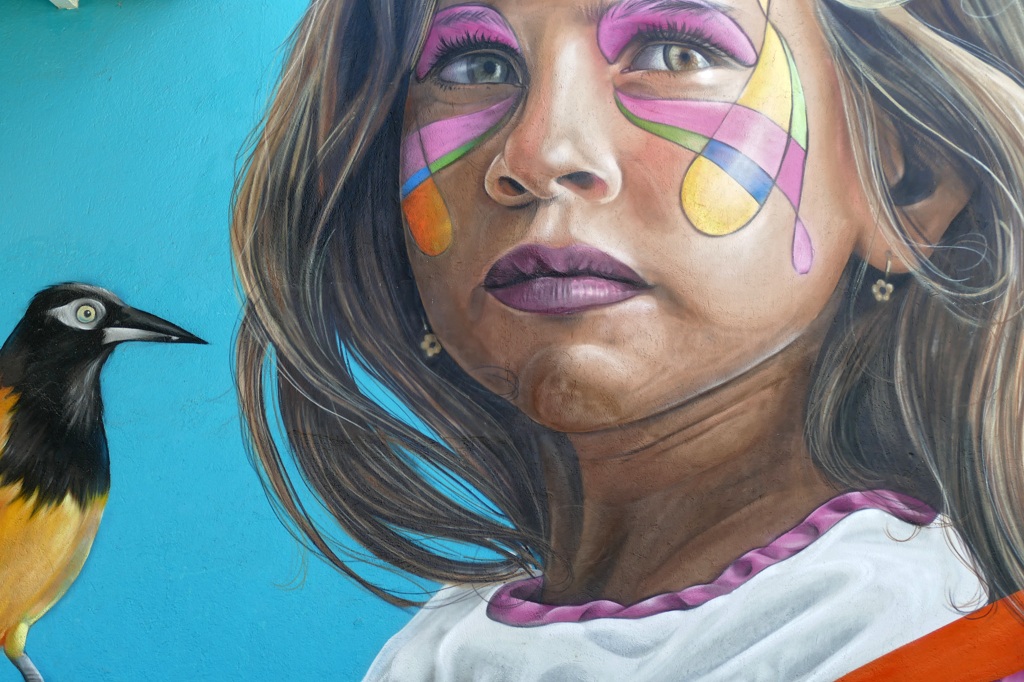
After Reinier explains to me also the functions of a really sophisticated E-bike, I try it out in a sidestreet. I need to get used to the fact that the thing takes off like a rocket as soon as I tenderly touch the pedal. Let’s see how that’ll work out for me. I hit the road.
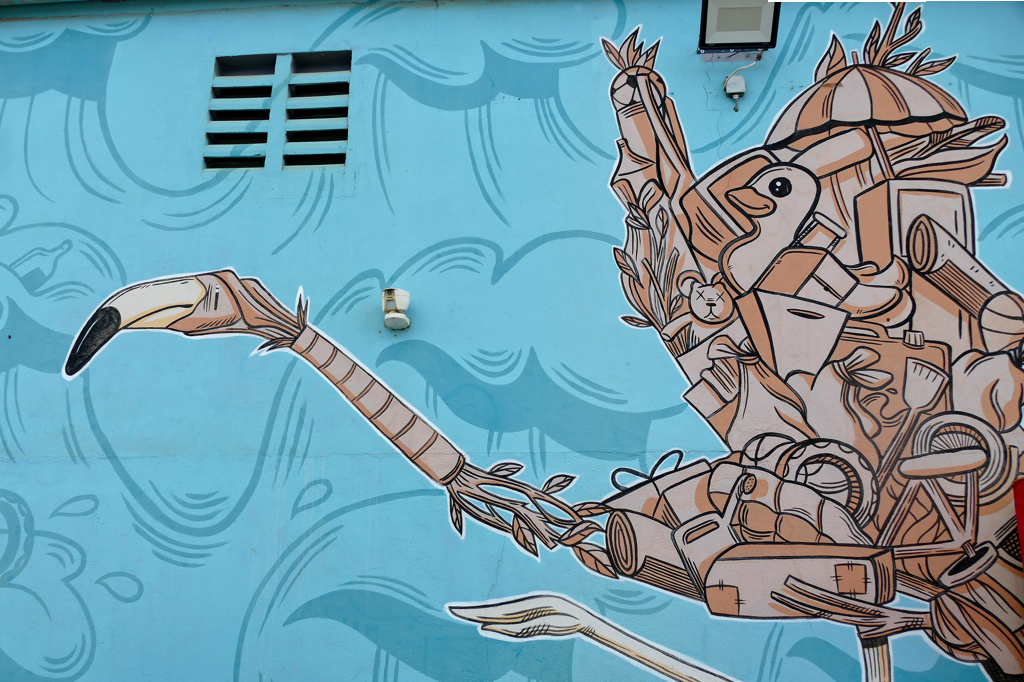
After about one kilometer, as I’m still busy figuring out how to get the right speed, my phone which is attached to the handlebar suddenly plays a cute tropical tune. Also, I see an info page opening on the screen. This is the App’s way of informing me that I’ve approached one of the murals. Hence, I stop to read the short text about the artist and snap a couple of pix. And then, off I go northwards where the tropical tune announces the next great piece of street art.
Same procedure: Paddle, read, snap, repeat.
Man, this is so much fun.
Born to be Wild
This way, I’m moving the blue dot across the map from north to south where I explore the quirky ruins of the Esmeralda Hotel. Various urban artists left their traces in this lost place. By now it’s noon, and it’s really hot. I’m glad that I took a large bottle of water with me.
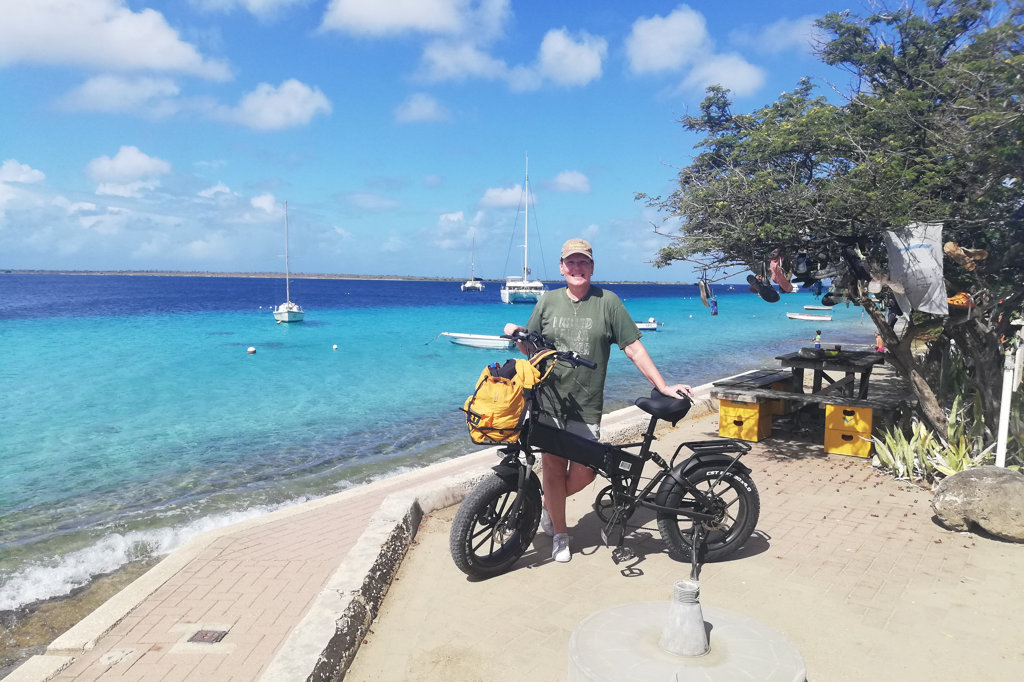
As I’m crossing Bonaire’s southern part from the west to the rough east coast, I dare to put the bike into a higher gear. Immediately, without much paddling, the bike speeds at 30 kilometers per hour. For a car, that’s not fast. But I’m sitting on a bicycle wearing shorts and a T-shirt and no helmet. On this country road, a goat, a donkey, or even just a lizard can unexpectedly cross the road. I slow down to 27. It’s awesome: I’m hardly paddling at all, and I’m basically racing across the island. I’m amazed. And a bit intimidated.
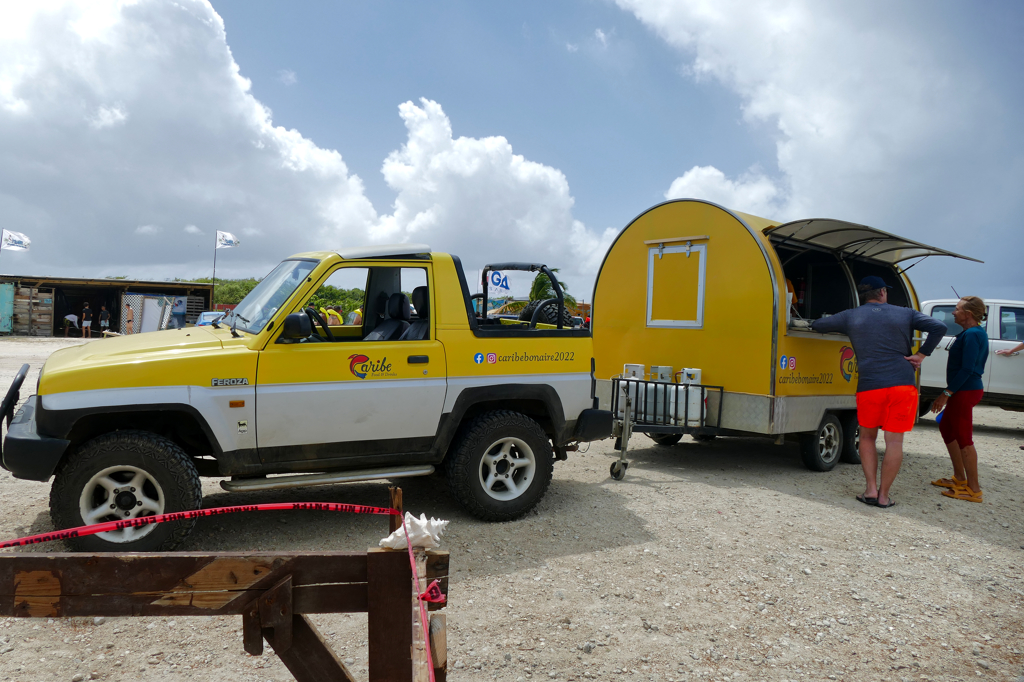
As I reach Lac Bay on the east coast, I don’t need to check my watch to know that it’s about lunchtime. I’m hungry and my water bottle is almost empty and I need a break. Hence, it’s a good thing that the App doesn’t only show where to see the most beautiful street art but also where to find the best street food. I park my bike and grab a delicious fish wrap at the Caribebonaire food truck while watching the windsurfers gliding by.
All Good Things Must Come to an End
Before I head back to Kralendijk, I quickly pay the abandoned shrimp factory a visit where I find some of the most inspiring pieces.
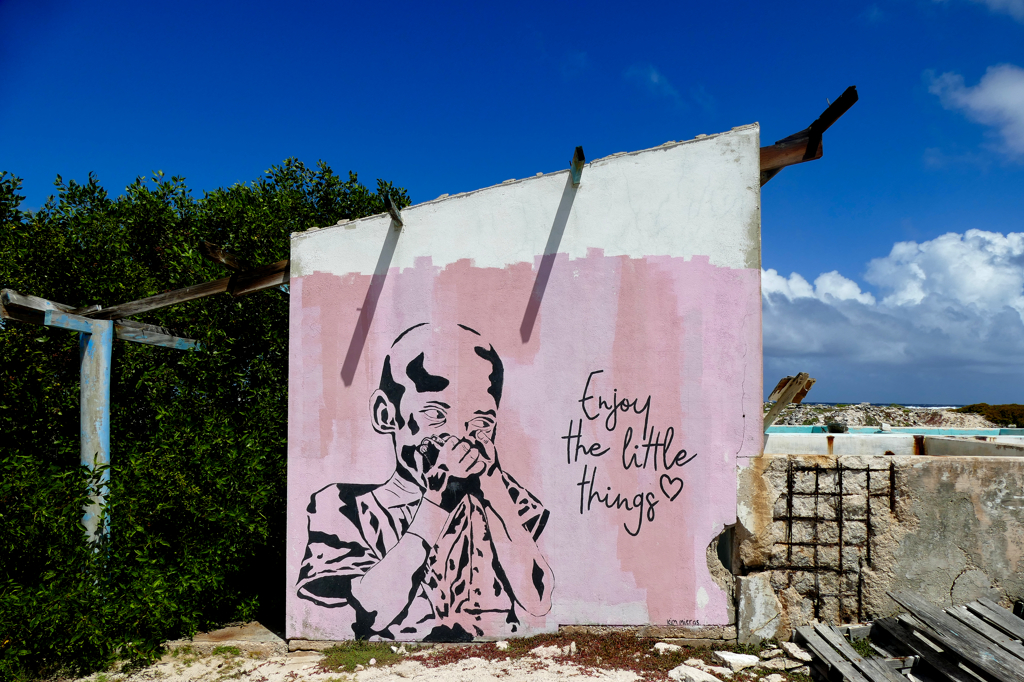
On the way back, I stop at Playa Palu. It’s 3 p. m. and Reinier is closing his store only at 5. I lock the bike, undress in the shade of a tree, and jump into the crystal-clear water. After an extended swim, I bring the bike back.
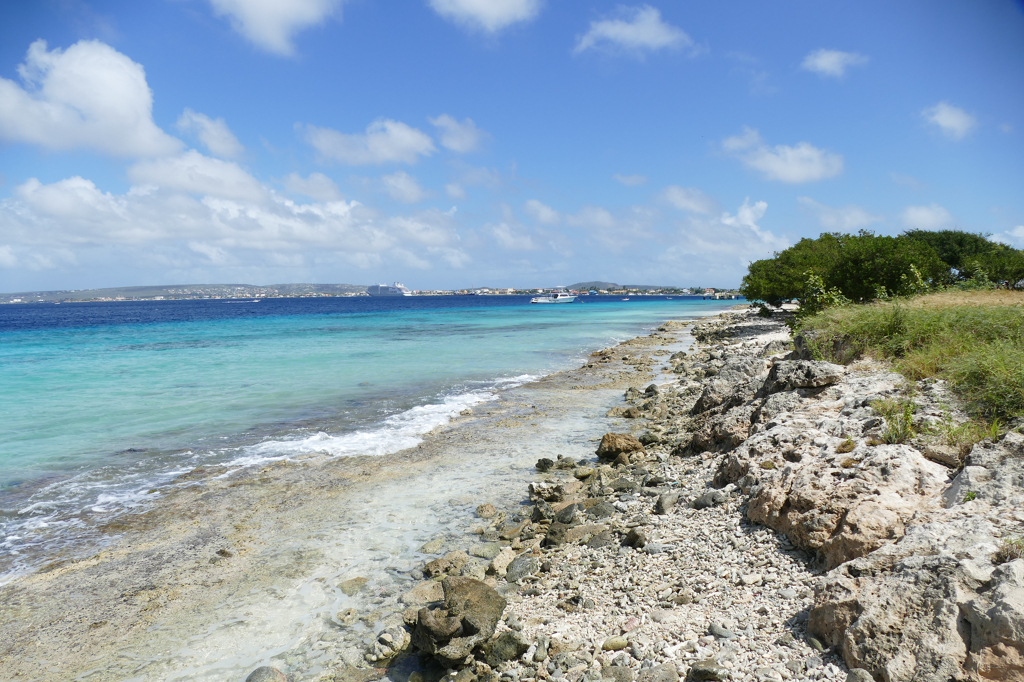
It was such an inspiring experience, and I had so much fun!
The whole concept of this tour is so simple and yet absolutely genius. I actually cycled about 35 kilometers with just a very short lunch break – and did not get tired.
If you want to go on a self-guided street art and street food tour in Bonaire, you can get just the App for 25 US$ for one day. You can then go mural hunting for instance by car.
To get the package of a scooter or an E-bike together with the App, prices start at 55 US$ depending on which kind of bike you finally choose.
For further info and booking, go to Greenbikes Bonaire’s website. They have many different two-wheelers and can organize various fun and unique tours.
The Artists
Over the past years, I have put together many posts on street art: From painted walls all over Berlin to an abandoned hotel ruin on the island of Naxos. From socio-artistic undertakings in Amsterdam, Copenhagen, and Paris to a glamorous art project in Morocco’s capital Rabat – the world seems to be covered in breathtaking murals by world-renowned artists.
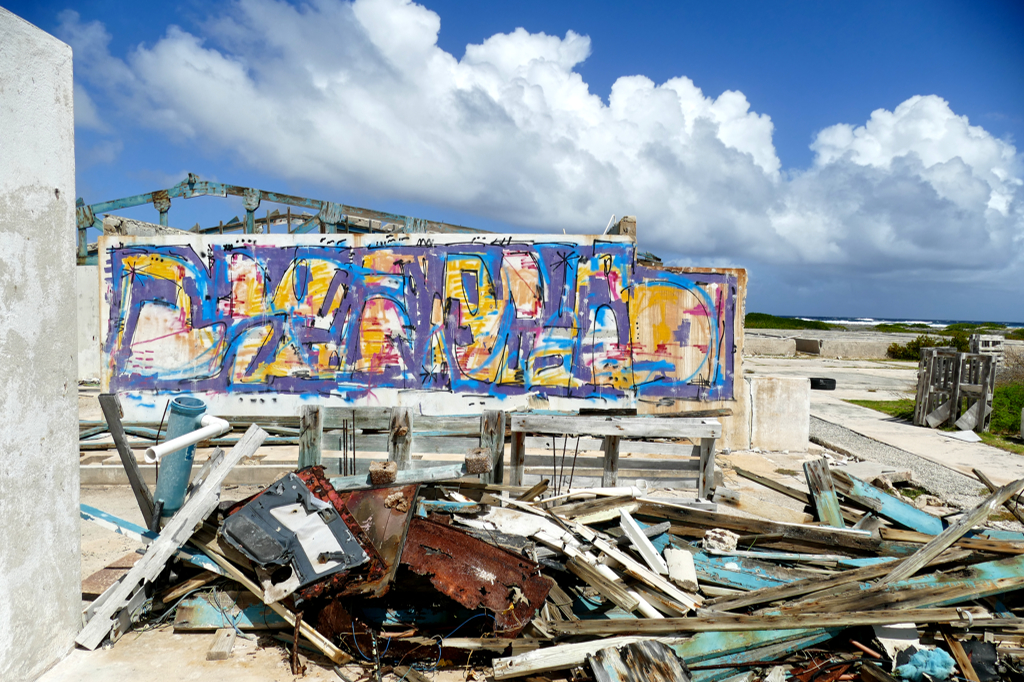
And while this is also the case in Bonaire’s little yet highly popular sister Aruba where Jack of all trades Tito Crespo transformed an entire town into an open-air gallery by inviting urban artists from around the world, you won’t find those internationally famous names in Bonaire.
But does it really matter?
Street Art is getting more and more popular. We got from illegal spraying of walls’n’trains to commissioned larger-than-life masterpieces. In places like London, professional agencies commission walls for so-called advert murals. Hence, not every work you see in the streets is street art.
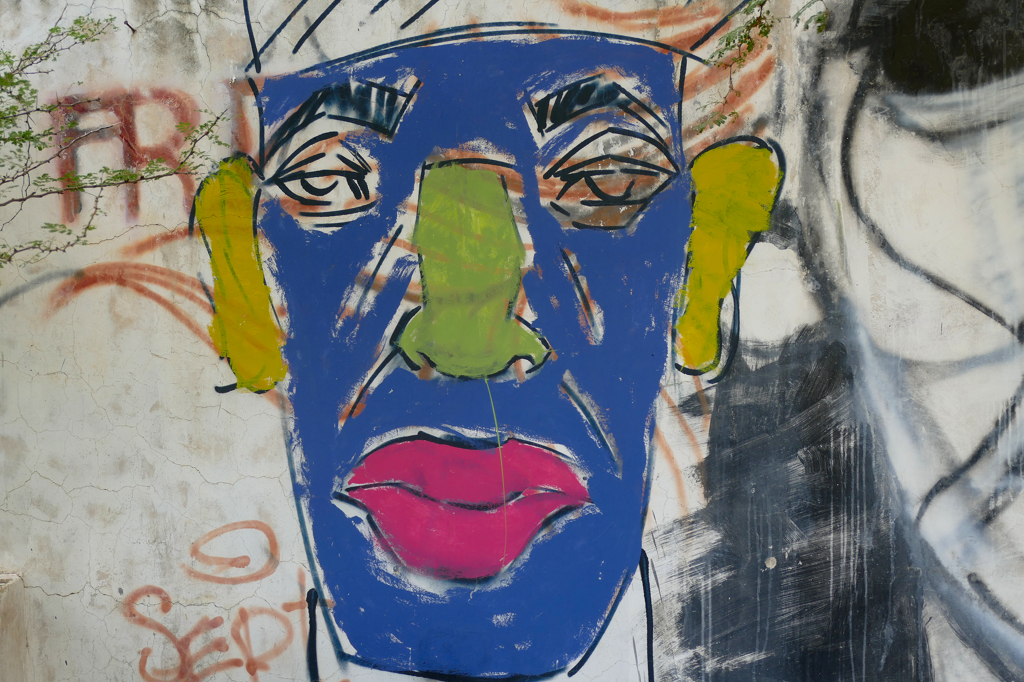
I’d argue that Bonaire’s street artists are even closer to the roots than many of the super-professional contract artists who create murals in the metropolises of the Americas, Asia, and Europe.
The amateur artists of Bonaire who paint the walls’n’fences on their island do it with passion and joy.
That’s the spirit!
Below, you find the Instagram accounts of all those aficionados. There, you can check out what else they have in store.
Aloha Bonaire
Loes Hak aka Aloha Bonaire came to Bonaire with her family in 2013. She’s looking back at various jobs like horse groomer and taxi driver, actor and extra and actor, set designer and landlady of a B&B. Her finest vocation, however, is being an artist.
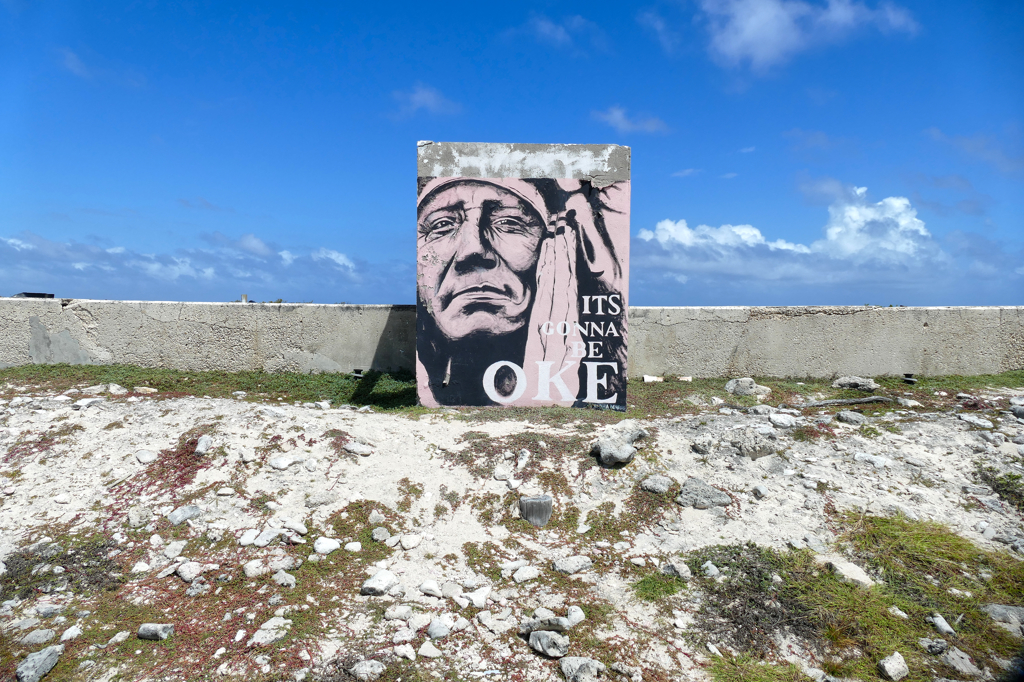
Ever since she came to Bonaire, she keeps embellishing the island. While some of her pieces are commissioned, many are still painted at her own initiative, and so is the striking mural called It’s gonna be oke.
At the beginning of the Covid crisis in the spring of 2020, Loes painted the chill Native American on a brick cube in the vicinity of the abandoned shrimp farm. She copied the face with his reassuring smile from a photo as she intended to carry an uplifting message into those challenging times.
Loes Hak also painted a complex of three houses on Kaya L. D. Gerharts which you can see above.
Alejandro Betancur
Alejandro Betancur is an artist, graphic designer, and architect from Colombia. He’s been living on the island of Bonaire for quite a while now.
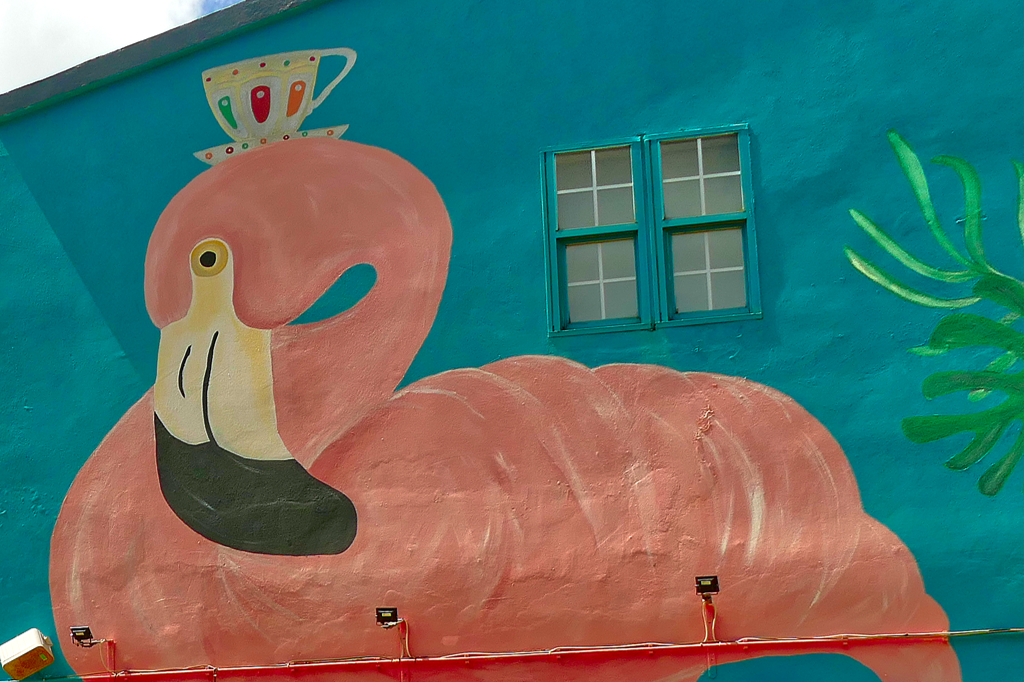
Although Alejandro has been painting since he was 8 years old, the beautiful larger-than-life flamingo on the façade of Maya’s Corner Café in downtown Kralendijk is his first mural on the island. In this work, he masterfully combines everything that makes Bonaire special.
Rita Carswell and Jeannie Villacorte
This female artist duo resides in Colorado and paints commissioned murals. Rita Carswell graduated from Tyler School of Art in Philadelphia in 1984. Since then, she’s been teaching and painting in Philadelphia and Colorado Springs.
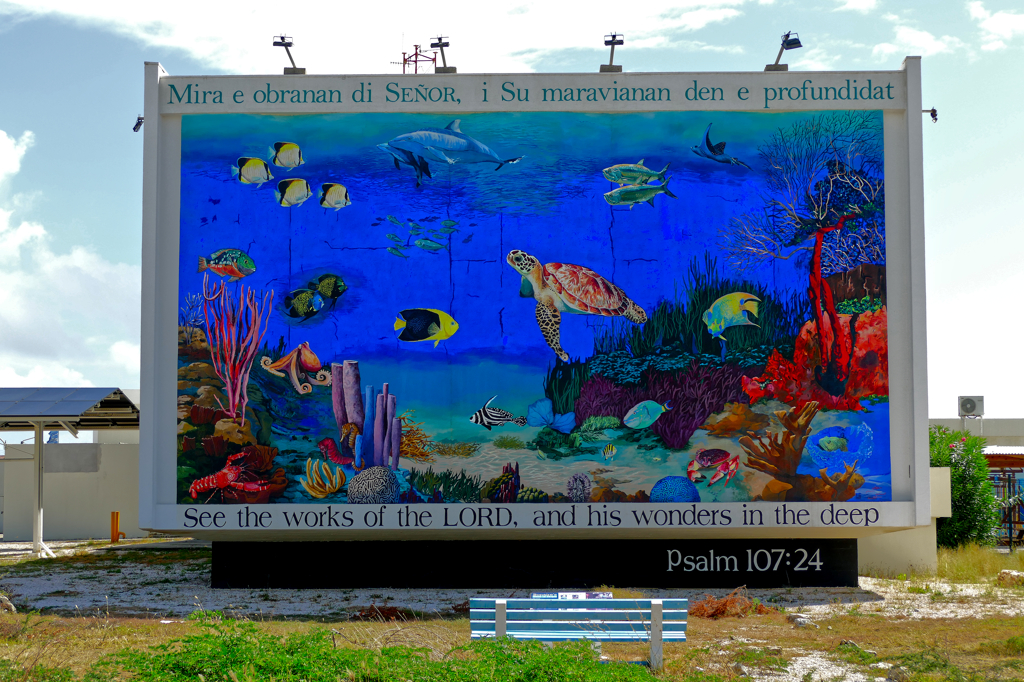
Her partner in crime art is Jeannie Villacorta who after having studied illustration at Syracuse University created designs for musical productions through the years and painted murals. She also has taught art.
In 2008, the ladies merged their talent and created murals for private homes and businesses, as well as schools and churches.
In 2018, Bonaire’s Trans World Radio commissioned Rita Carswell and Jeannie Villacorte to create a mural depicting the magical underwater world surrounding Bonaire. Today, colorful fish and creatures of the sea are floating on the façade facing the Kaya Gob. N. Debrot roundabout. Since TWR is a Christian broadcaster, they quoted Psalm 107:24 above the painting Papiamentu and below in English.
Tymon De Laat
I introduced Tymon De Laat’s portrait of Isabel with the Trupial bird already above.
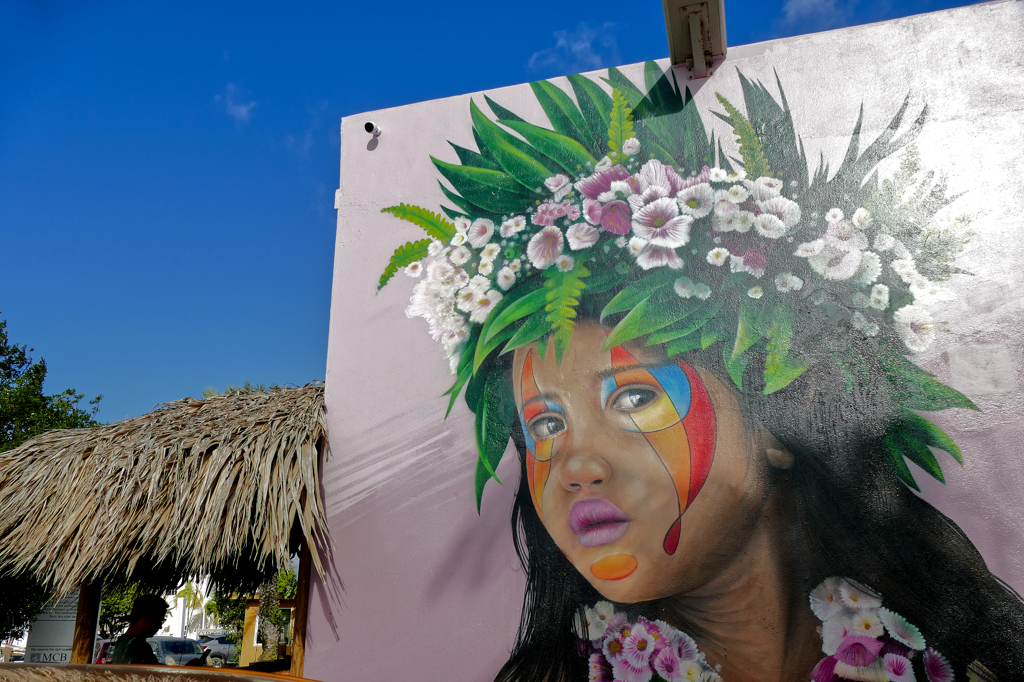
However, he also portrayed Leilana on the façade of Kralendijk’s Tiki & Co. bar. While de Laat normally paints from pictures he has taken himself, he found the photo of this little girl that he’s depicting in his mural online.
Dodici
Edoardo Trionfera aka Dodici grew up in Rome but currently resides in Rotterdam. Invited by the project Street Colors Bonaire, he created several murals on the island in 2020. On some of them, he worked together with local youngsters.
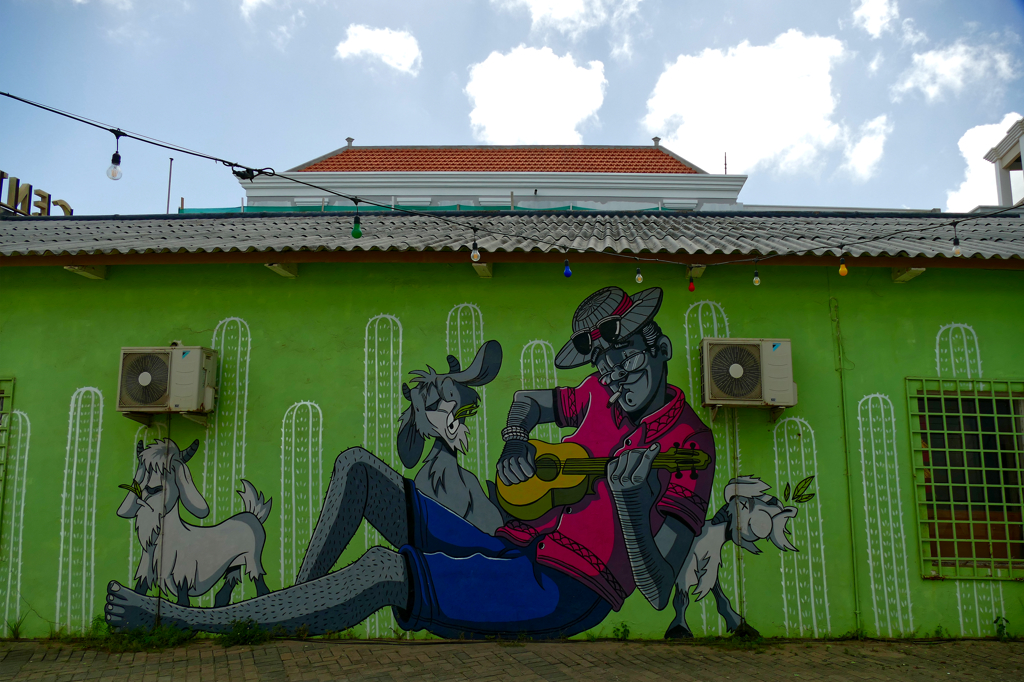
The reclining guitar player in the mural that you’ll find on Kaya Korsou stands for Bonaire’s laid-back vibe. However, the title Bencho, Meki, Reki ku Treki was invented by a local radio host as he named the guitarist Bencho and the goats Meki, Reki, and Treki.
Above, I’ve also introduced Dodici’s assembled Flamingo that he painted on the Selibon recycling center.
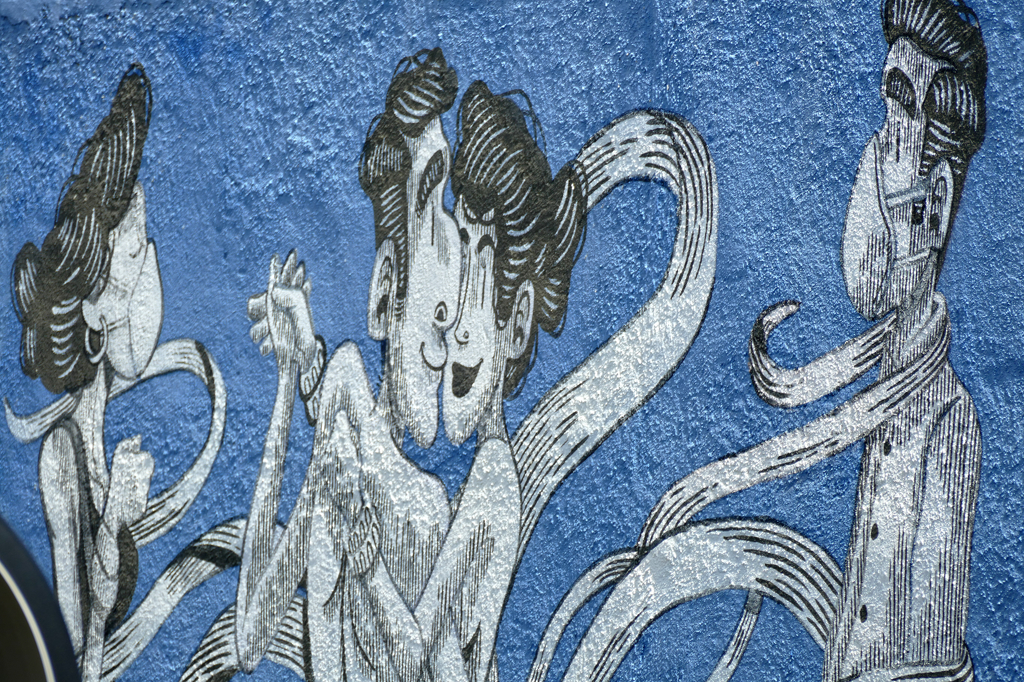
Finally, Dodici – which by the way translates to twelve in Italian – also participated in the so-called Street Art Jam where multiple artists decorated a blue wall behind the police station at the intersection of J.A. Abraham Boulevard and Kaya G.F Croes with very different murals.
There, Dodici painted his take on love during the pandemic: A couple dreams of dancing cheek to cheek while being kept apart by masks and social distance.
Judmar Emerenciana
Judmar Emerenciana was born on the island of Curaçao in 1997 but was then raised in Bonaire. He was painting and drawing as soon as he could hold a pencil. Two high school art teachers encouraged him to perfect and professionalize his skills which got him into cartoons and graffiti. Today, Judmar works as a graphic designer for the local company Edge Art Designs.
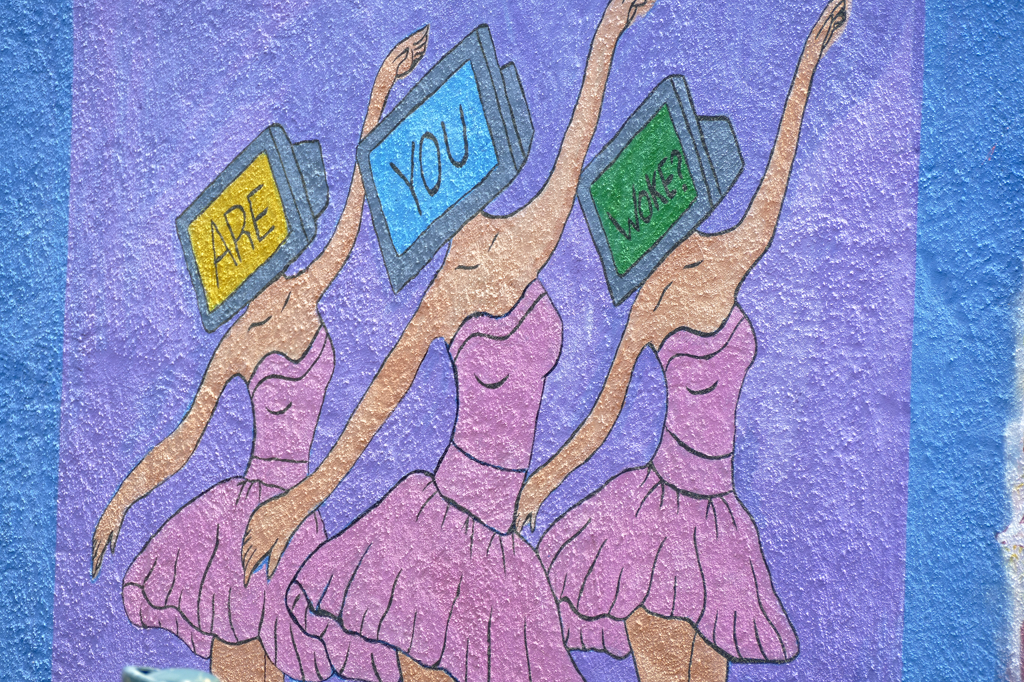
He also goes by the pseudonyms MARZ and Marzworldd. He painted the mural Are You Woke on the occasion of the so-called Street Art Jam in 2021.
Robert Nestor Kramp
Robert Nestor Kramp was born and raised in the Netherlands and named after Robert Nesta Marley, far more famous as the legendary Bob Marley. Kramp’s parents, however, came from Surinam.
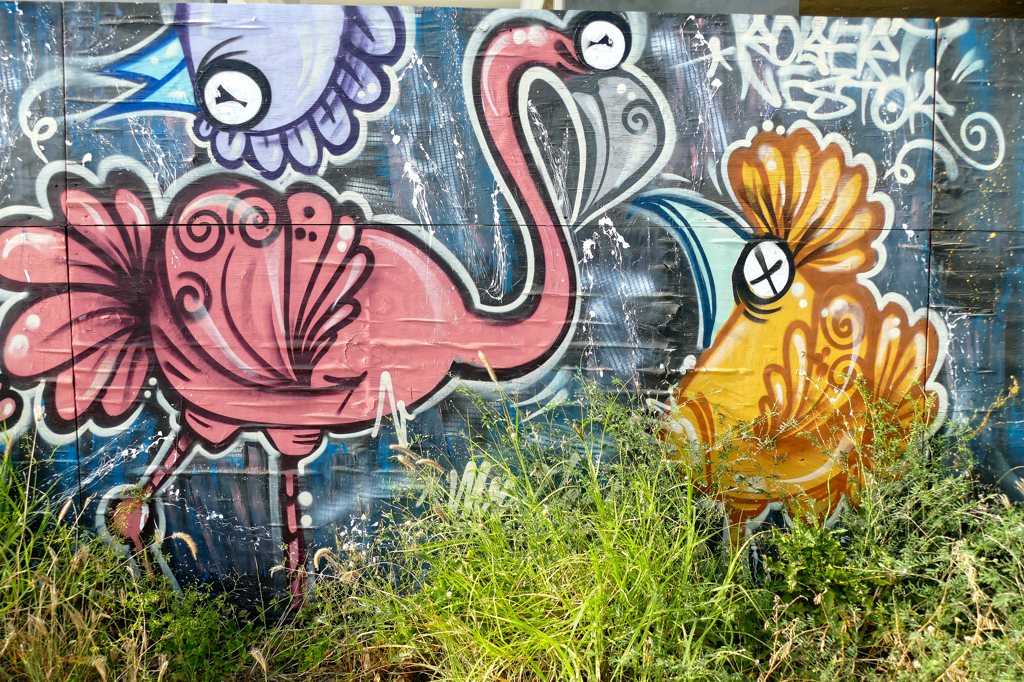
Robert has always been passionate about fashion. Since as a young man, he didn’t have the means to buy designer pieces, he began to create his own clothes. As others loved his pieces and wanted to commission them, he established small designer brands where he customize his own fashion.
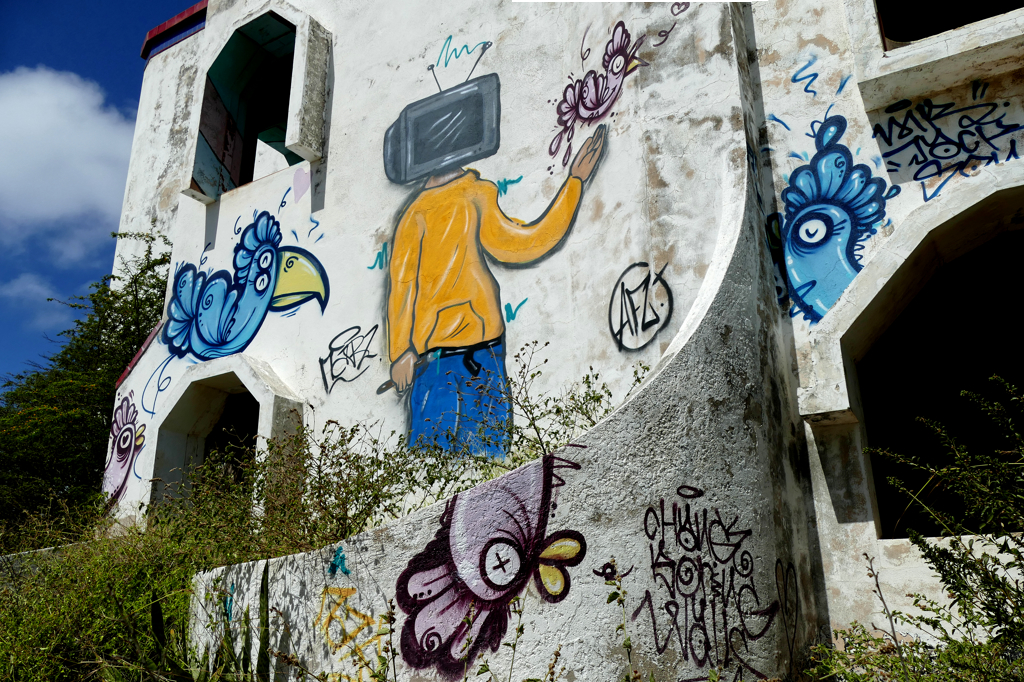
Robert has visited many places in Europe and came to Bonaire in March 2020. He intended to do something for the local community and work with teenagers and young adults. He began to volunteer at the Hofi Kultural where he now organizes art workshops.
Apart from painting murals in many places around the island, Robert still designs clothes. He also handcrafts small souvenirs and paintings. Over the past years, he became a vital part of the local creative community.
Garrick Marchena
Garrick Marchena was born in Aruba in 1966. Based in Curaçao, he is one of the most skilled mural artists on the islands.
Although he had shown great artistic talent already as a child, he first studied civil engineering at the University of Pittsburgh on his father’s advice. After his bachelor’s degree, he actually began working as an engineer but quickly resigned. Marchena preferred working as a freelance graphic designer in his younger brother’s company.
In 2009, he created his first mural Urban Angel in Willemstad. This work is actually said to be Curaçao’s very first large-scale mural. Since then, he created many wonderful portraits mainly in Curaçao but also in Aruba and Bonaire.
While technically speaking, Marchena’s first works were illegal, he now is regularly commissioned to create murals. His favorite subjects are children and animals. Also, many of his murals include birds as a symbol of innocence and freedom.
Whenever in doubt if a mural is by Marchena, look for his self-designed font inspired by the Native American petroglyphs, combined with Californian Cholo font from the 1950s. This iconic lettering will definitely give him away.
Marchena in Bonaire
The portrait of a mysterious woman on Kaya Gen. C.M. Piar is called Kòrda nos Rais, which translates to remember your roots in Papmiamentu. Next to her are the blossoms of a Wayaka tree native to Bonaire.
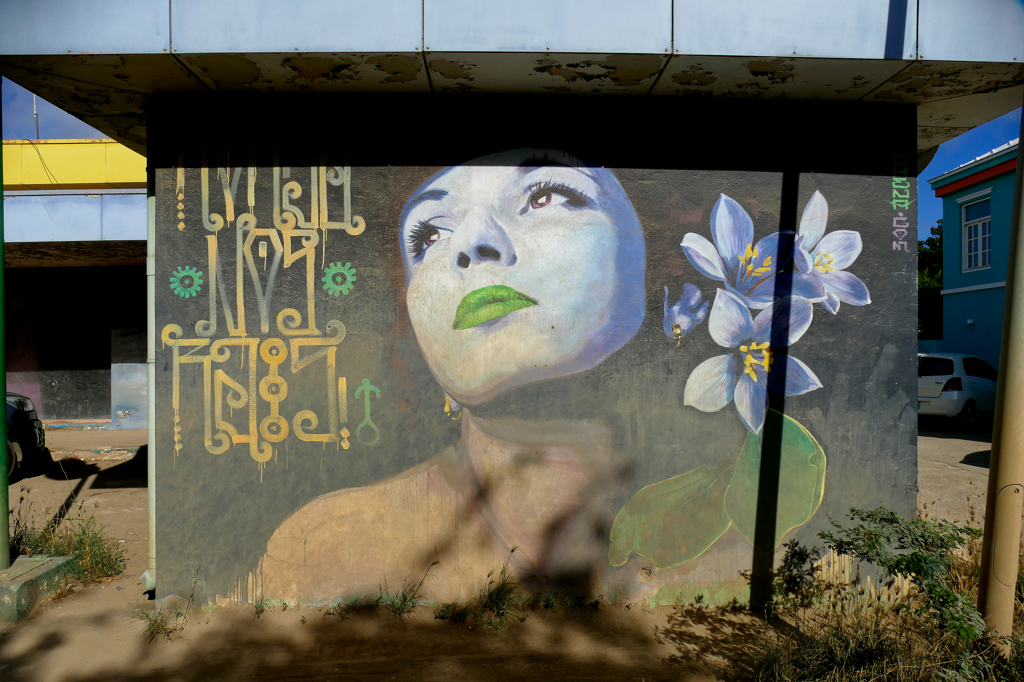
Another one of Marchena’s murals is found at the beginning of the Kaya J. N. E. Craane beach promenade. The lady with her long hair flowing in the breeze resembles a mermaid. As a matter of fact, this is by no means a commissioned piece; technically, it was created illegally. Painting it unnoticed was a challenge. Marchena was busted during sketching the portrait. However, he was able to finish it after dark. Nevertheless, the mural has never been removed.
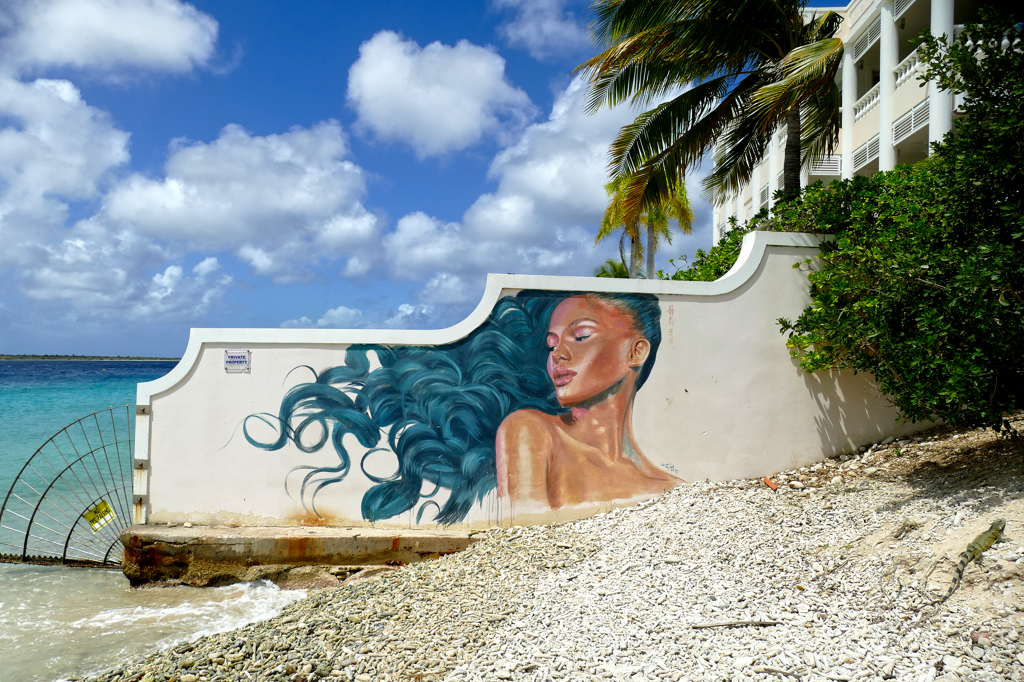
Since Marchena is such a superstar, I couldn’t help but also feature him in my posts on Street Art in Aruba and Street Art in Curaçao, obviously.
Keila Mensché
Across from Bonaire’s airport is a long wall full of colorful murals that were commissioned by the private community Waterlands Village. Initially, it was a school project, hence some pieces are still from those school kids.
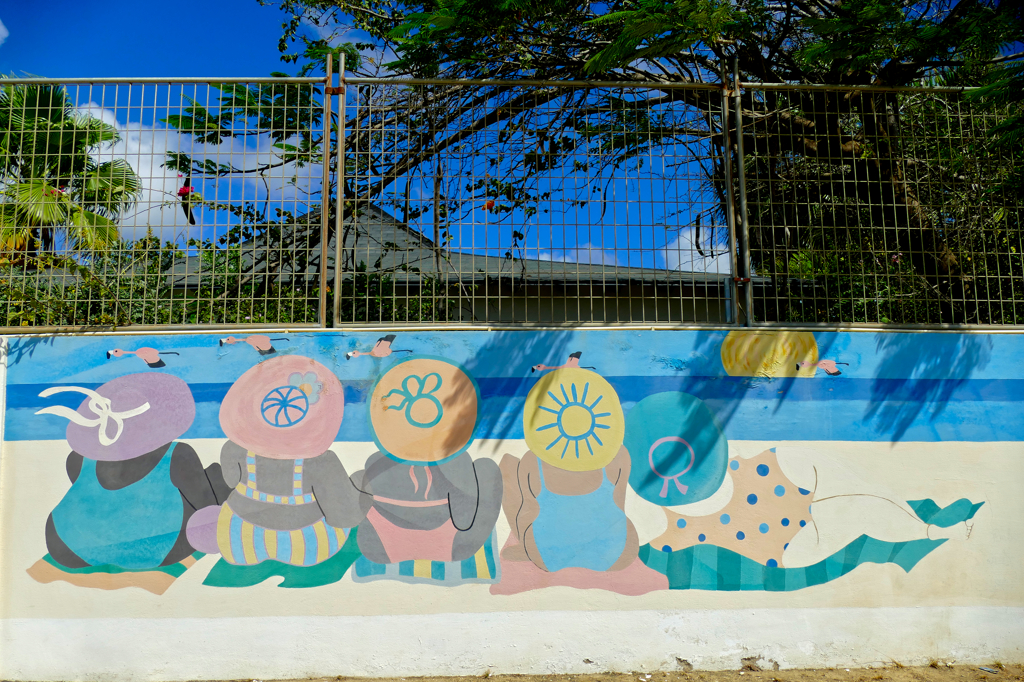
De Dikke Dames, which translates to the fat ladies in English, were painted by Keila Mensché in 2008 when she was a young teenager.
Keila was studying at the University Dutch Caribbean in Curaçao where she also worked on a series of small canvases. She was planning to launch her own online art shop. Bus sadly, as Keila was born with a heart condition, she passed away in 2021 at the age of only 26.
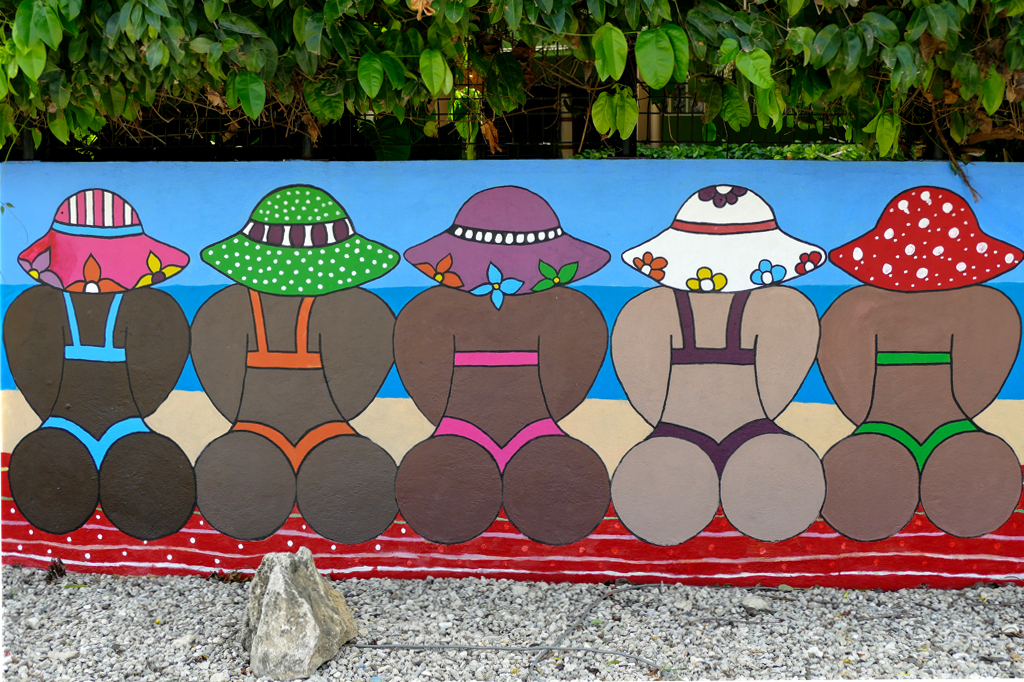
Keila Mensché’s masterpiece not only won an art competition. The ladies with their iconic round bottoms are also an often copied motif that you’ll find in various places on the island.
Naamloozz
Kenneth Letsoin aka Naamloozz was born in Almelo in 1972 and lives currently in Rotterdam.
In contrast to the Netherlands, it’s Bonaire’s vibrant colors that impress him the most. And to be honest, he himself added to the vibrant appearance of walls, fences, and even containers.

You’ll find his colorful quirky little birds that are shaped like flying houses all over the island.
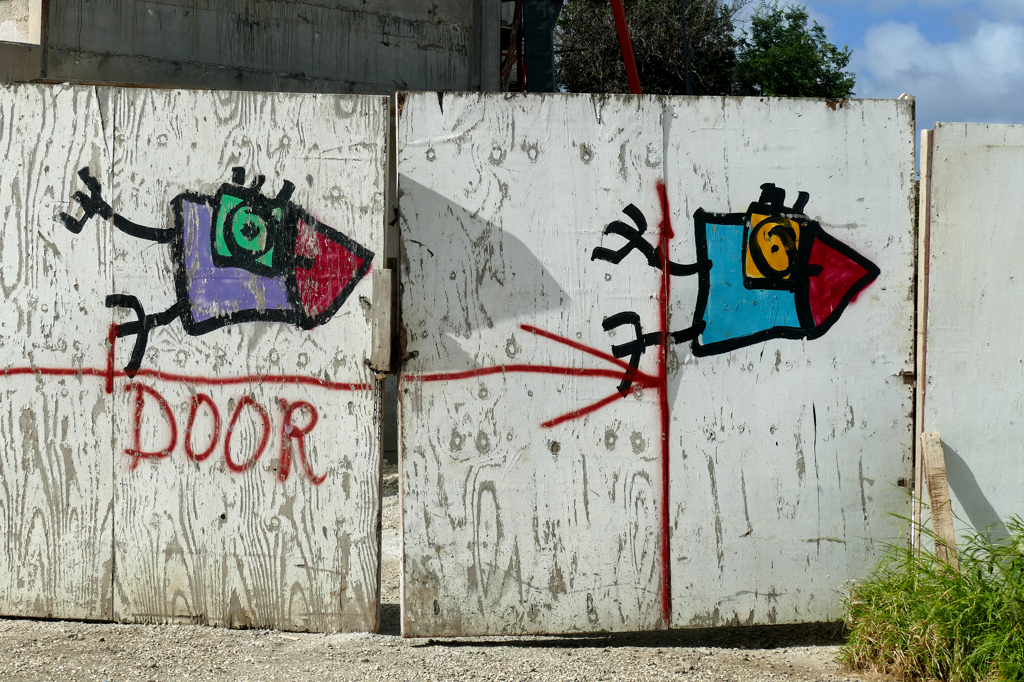
Henk Roozendaal
Henk Roozendaal was born in the Netherlands in 1947. There, he had a successful career in advertising. In 1999, he moved to Bonaire.
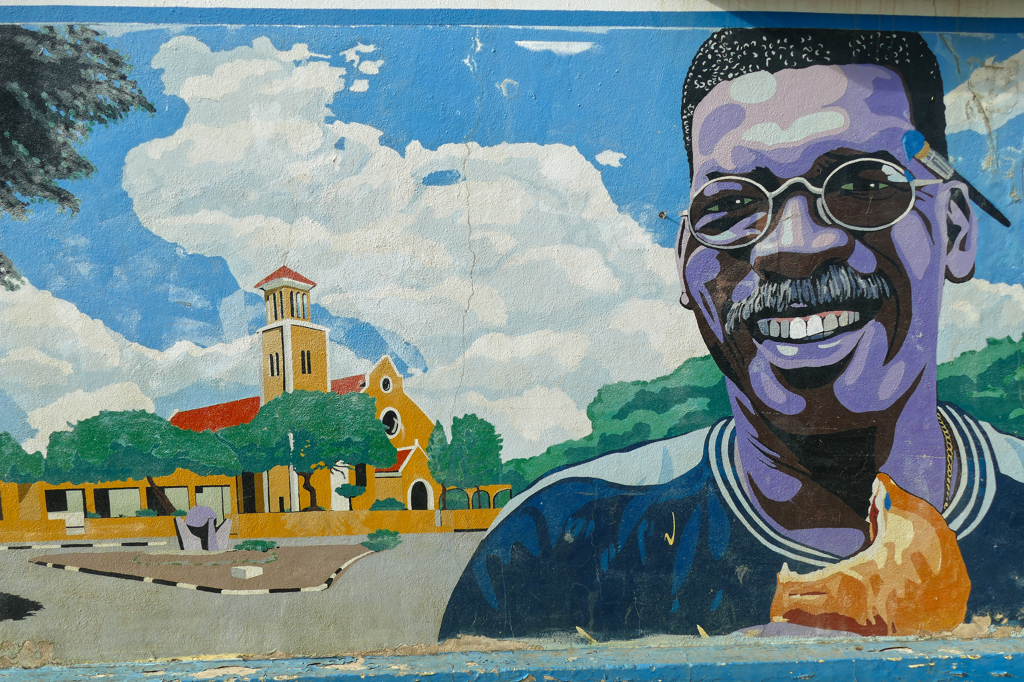
I presume you need some context: Nochi Coffie is a local artist, and a pastechi is a hearty-filled pastry.
Although painting had always been Henk’s passion, he began to paint professionally only after he came to the island. It was here that he developed his unique style.
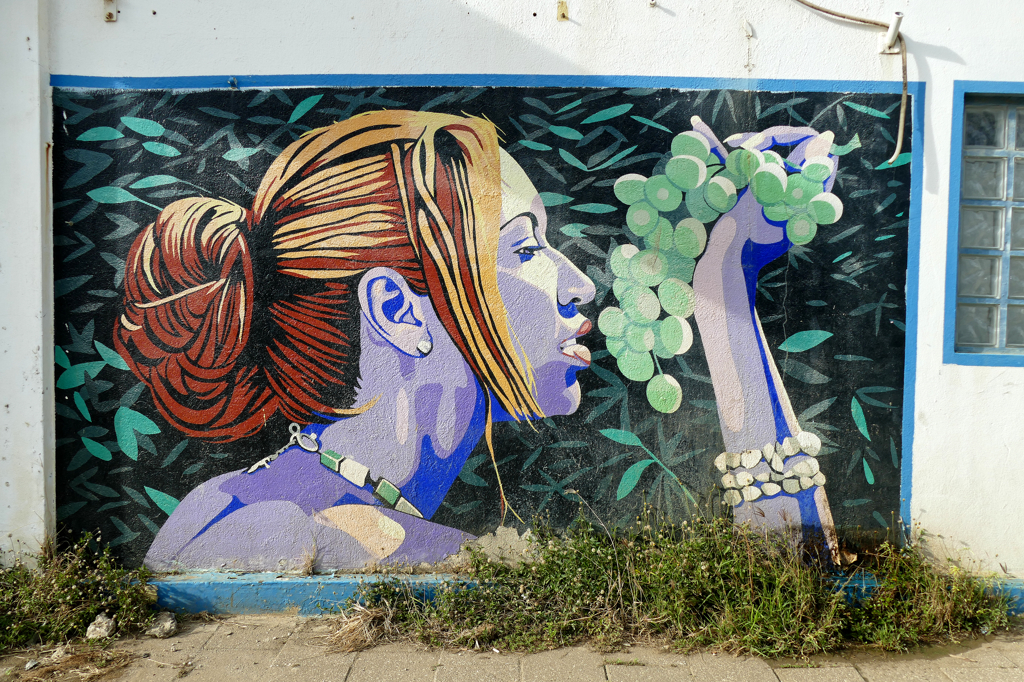
A local supermarket commissioned Henk Roozendaal to paint their façades. The artist embellished the walls with portraits of Bonaireans who almost everyone on the island knows between 2003 and 2009. Sadly, some of the murals were lost to renovations and change of ownership. Well, as we all know, transiency is in the nature of graffiti and street art.
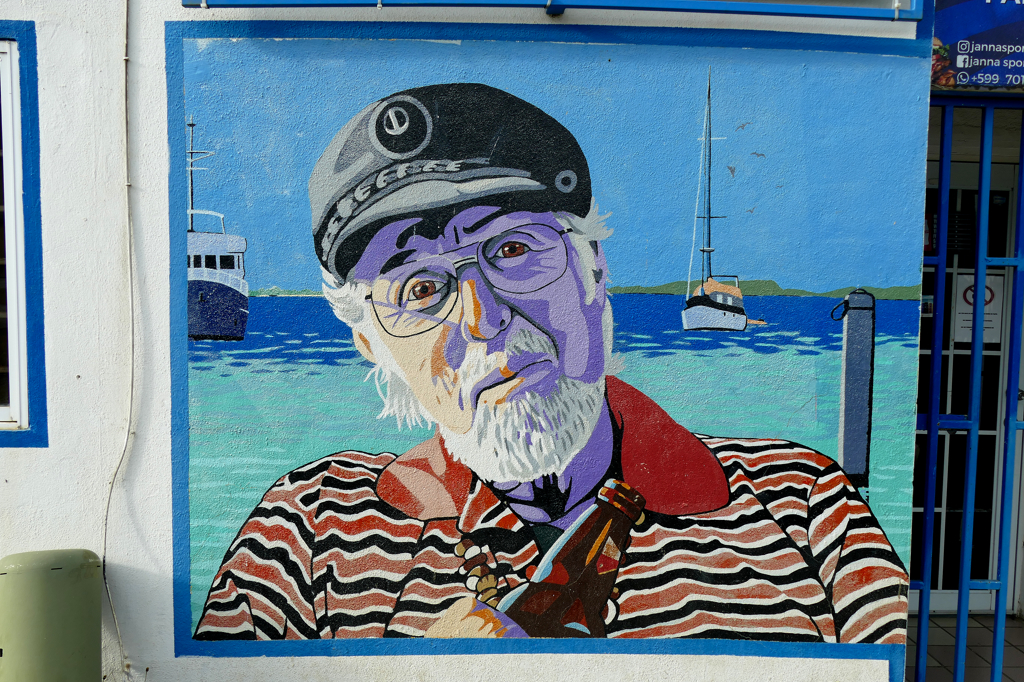
However, Henk Roozendaal published two books called Portraits of Bonaire in cooperation with the author Guus Gerritsen. In those volumes, Roozendaal and Gerritsen portrayed dozens of painted notable islanders in painting and writing.
Jose Smit aka Jo-Sea Art
As you walk through Kralendijk, make sure to look for some outstanding mosaics also in unexpected places. As a matter of fact, Jose Smit aka Jo-Sea Art even fixed small holes in the sidewalk with her unique combination of colorful and shiny shards’n’stones.
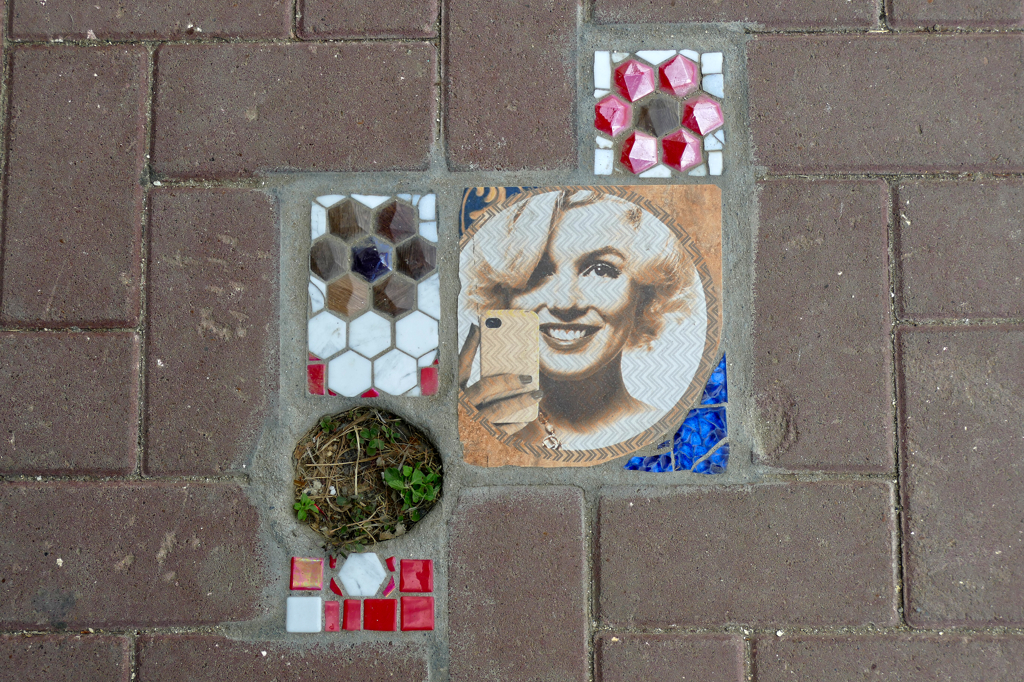
If you like, you can take some of Jose’s art back home as a souvenir since she designs bowls and small sculptures. Also, she organizes workshops where she teaches you how to create your personal mosaic.
Waterland Village Mural
During the building process of the Waterlands Village, murals were commissioned to embellish the fence of this gated community across from the airport. Initially, this was a school project, and some of the original designs still remain. However, artist and former art teacher Gemma van der Linden had to restore some of them.
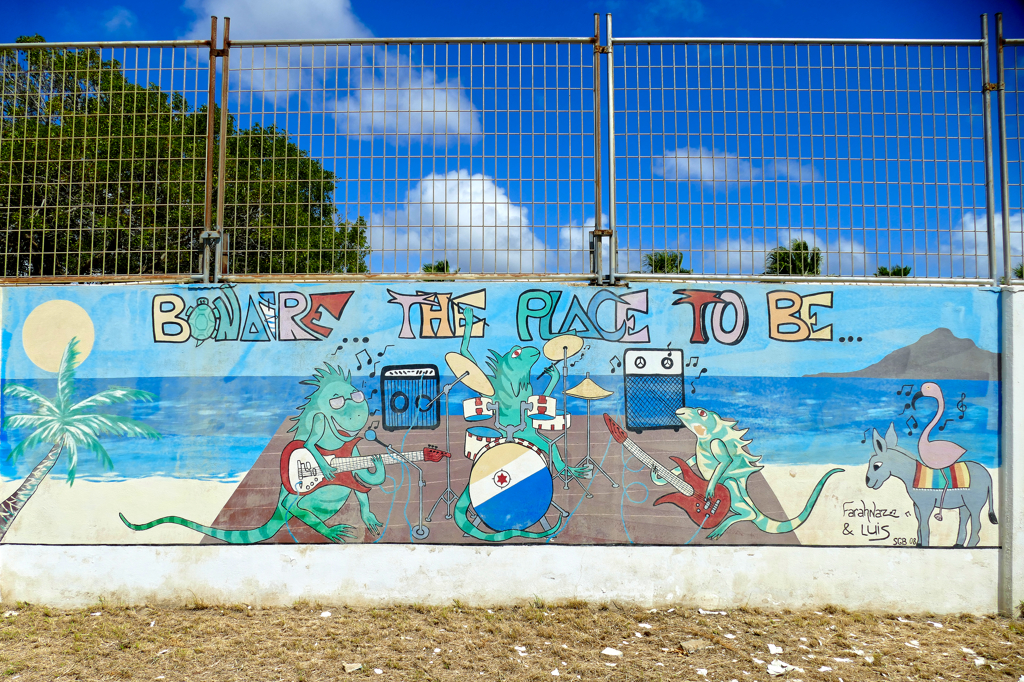
I’ve introduced Keila Mensché’s De Dikke Dames already above. While it’s probably the most outstanding and most copied part of the mural, I’d also like to point out the beautiful snorkelers by Jennefer Gemma.
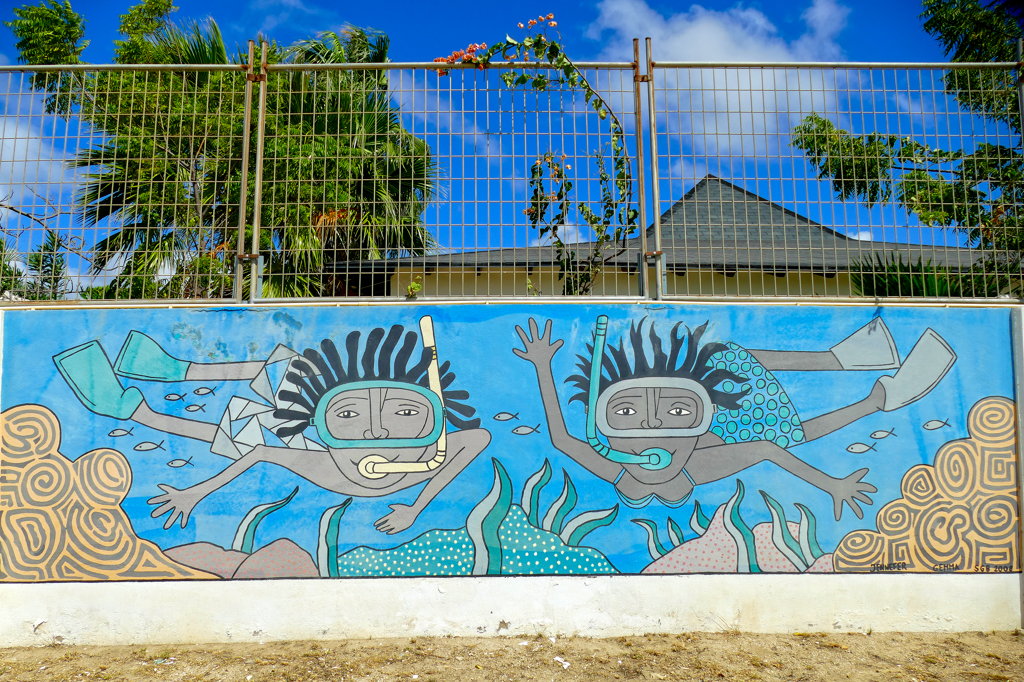
In 2018, Plataforma Kultural invited street artist Daniël Claessens aka Vinz.100 to the island. With more than 100 school kids, Claessens created a wonderful mural depicting local animals like flamingoes, parrots, turtles, and colorful fishes. Actually, it was this successful project that then resulted in the even bigger urban art project Street Colors Bonaire.
Solveig van Weingaarden
Solveig van Wijngaarden was born in The Hague in 1987. She visited the Communicatie en Multimedia Design Hogeschool in Amsterdam and has her own studio called Sue Art. Ever since she has worked as a professional artist, she has sold over 100 paintings.
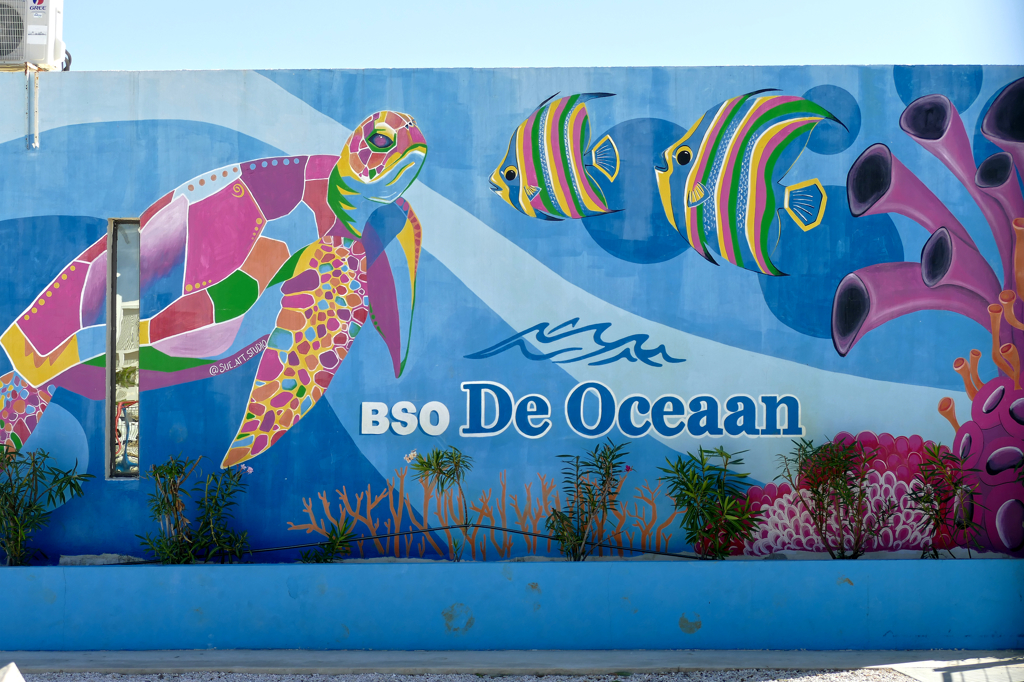
Yet, she discovered her love for street art only a couple of years ago, she has created dozens of murals by now.
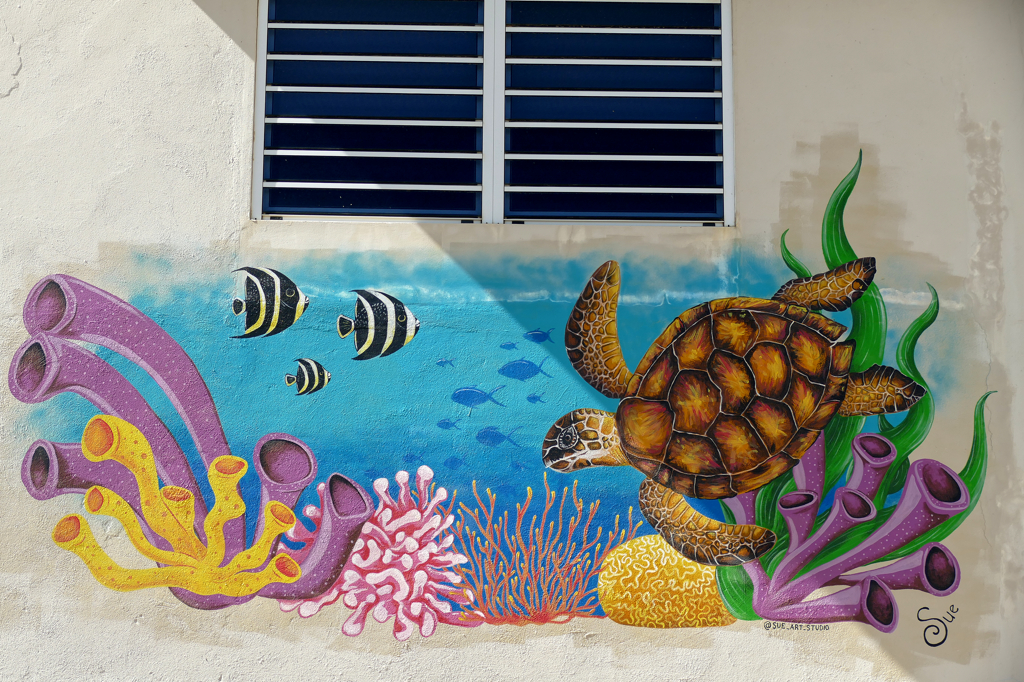
Sue is known for her colorful paintings full of beautiful details and positive vibes.
Wessel & Stein Koning
House owners John and Erica commissioned the Dutch brothers Wessel and Stein Koning – who as artists go by the name of IkwilGraffiti, which translates to I want graffiti – to portray the famous German actress and singer Marlene on one of their walls.
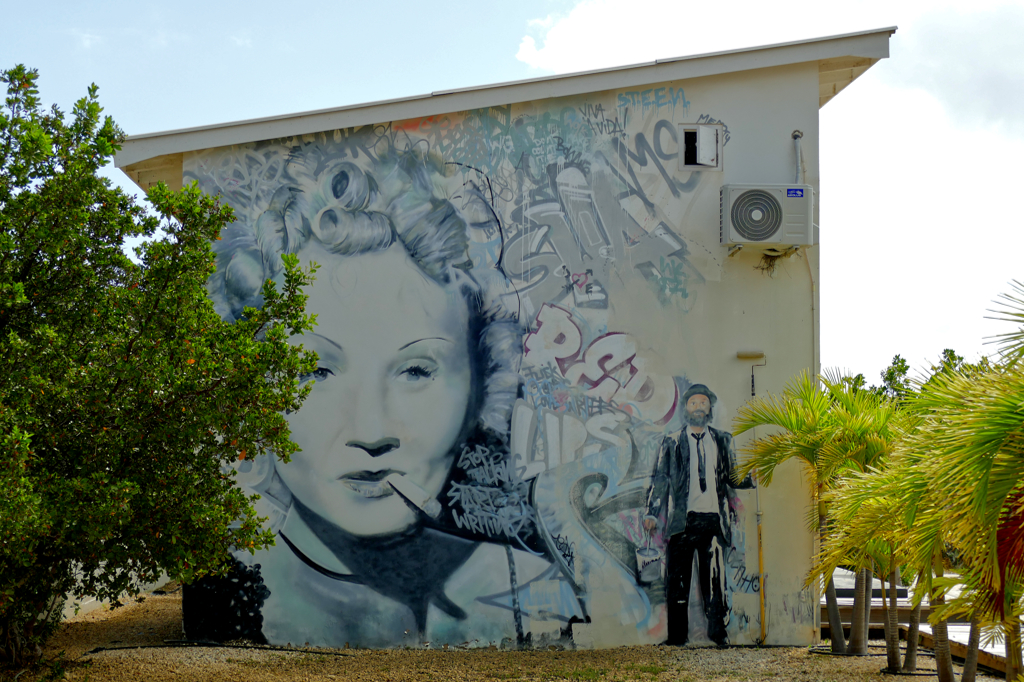
It is a tribute to Erica’s late grandmother who used to stick to Dietrich’s song Davon geht die Welt nicht unter – This is not the end of the world in English – as soon as something unfortunate occured. In addition to the portrait, the mural is full of personal references to the couple’s life like their wedding date, quotes from their favorite songs, and much more.
On Instagram
To dig deeper into the subject and see more amazing works the above-featured artists have created, you can check out their accounts on Instagram or Facebook:
Loes Hak aka Aloha Bonaire
Tymon de Laat
Dodici
Judmar Emerenciana
Robert Nestor Kramp
Garrick Marchena
Keila Mensché
Naamloozz
Henk Roozendaal
Jose Smit aka Jo-Sea Art
Solveig van Weingaarden
Wessel & Stein Koning
Map
This map should help you to find the murals I’m introducing in this post. Clicking on the slider symbol at the top left or the full-screen icon at the top right will display the whole map including the legend.
Amazing Street Art was only one kind of art I got to see on my visit to the island of Bonaire, obviously. To read about the rest, go to this comprehensive guide where you’ll find further valuable information that will make your own trip much smoother and even more enjoyable. To learn also about the other ABC-islands, my post As Easy As ABC: Island Hopping Between ARUBA, BONAIRE, and CURACAO has you covered.
Also, don’t miss out on the street art the islands of Aruba and Curaçao have to offer.
Pinnable Pictures
If you choose to pin this post for later, please use one of these pictures:
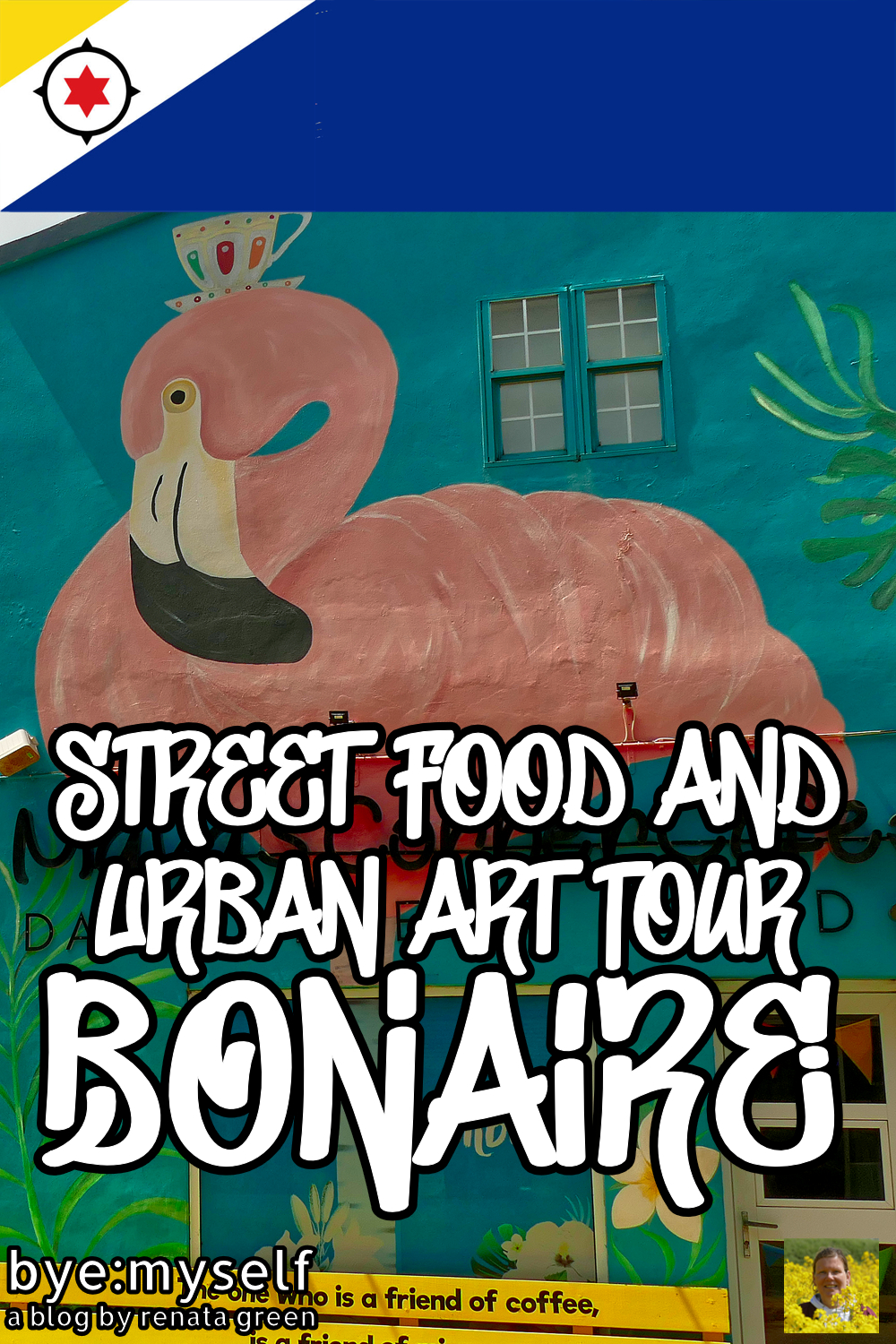
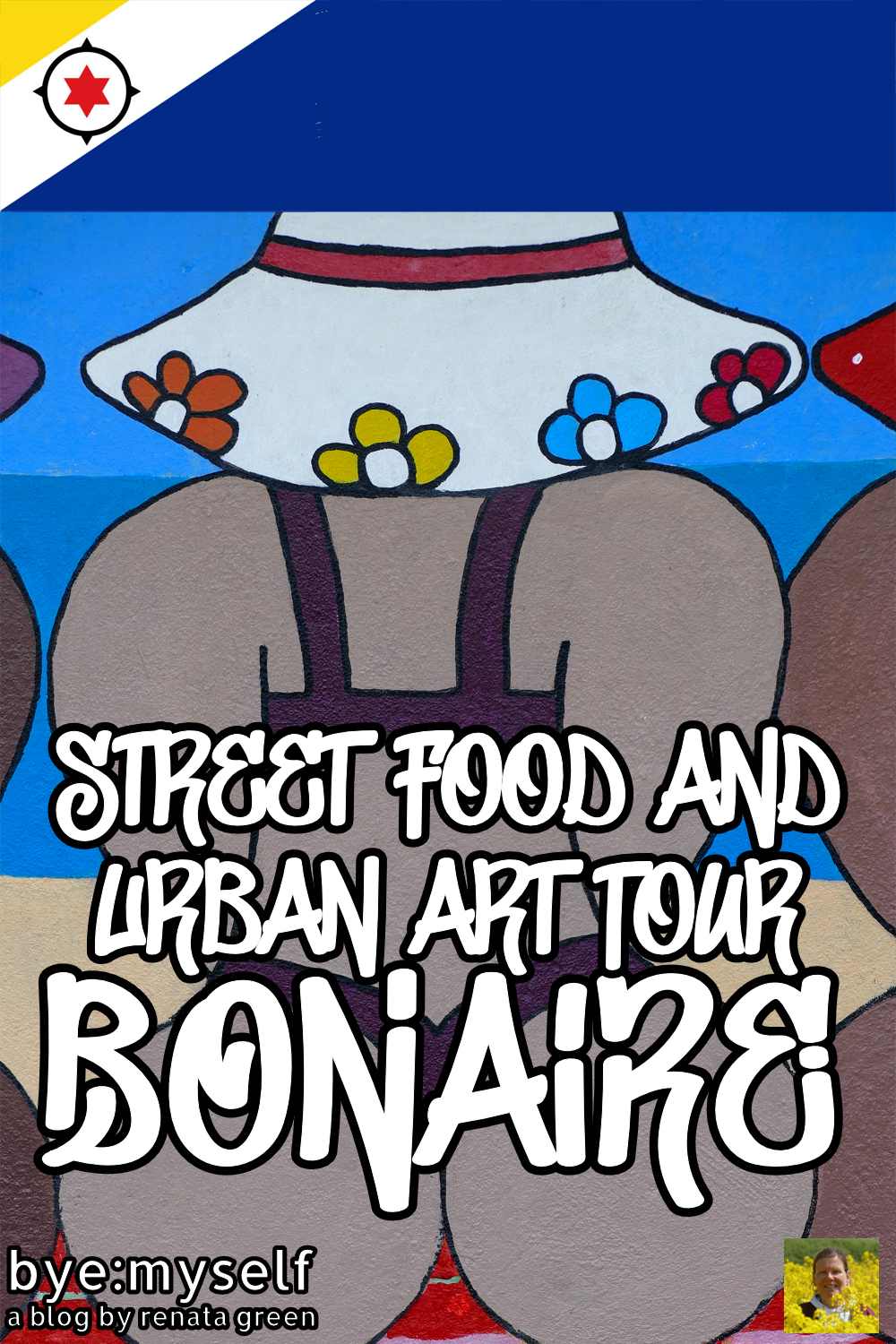
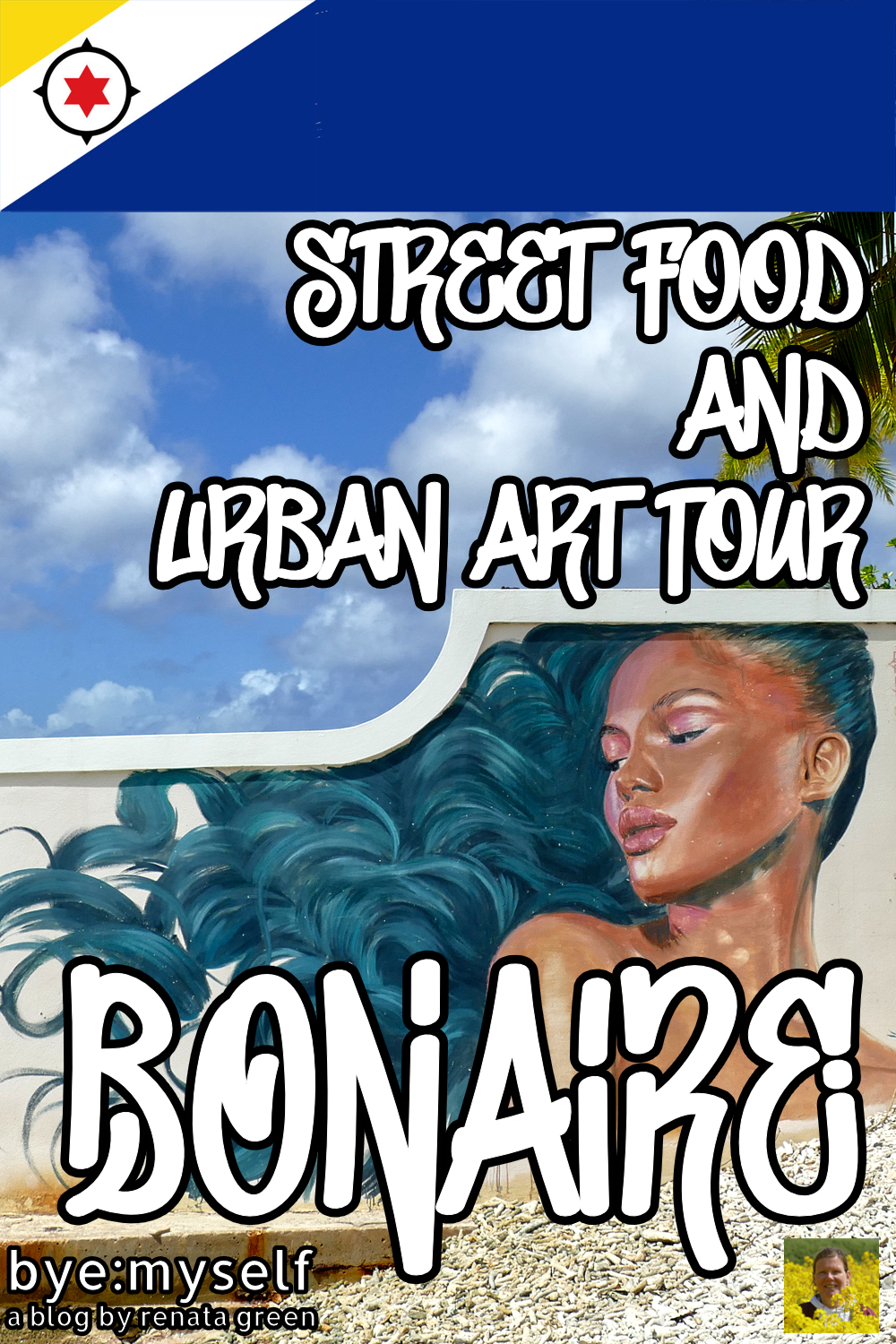
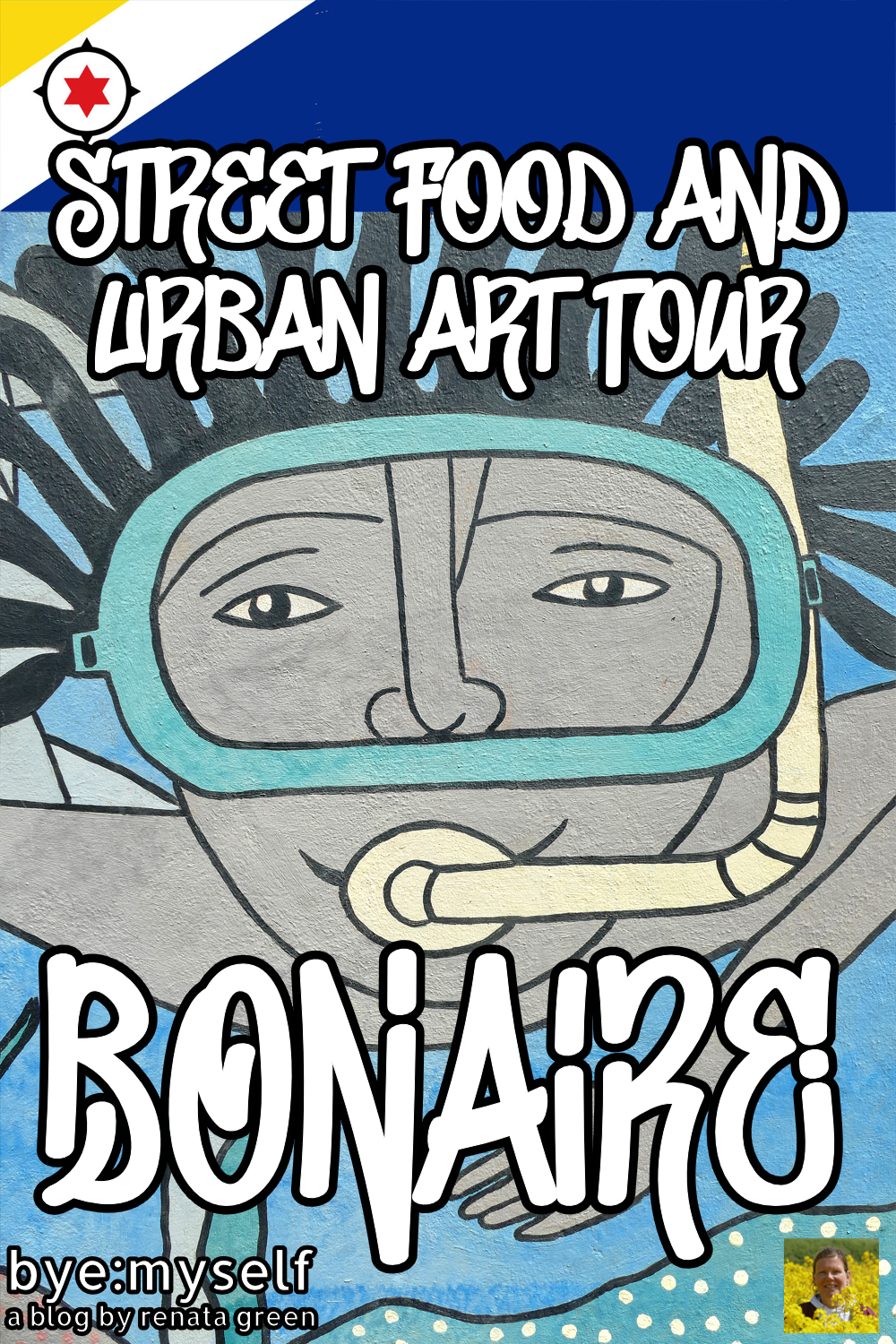
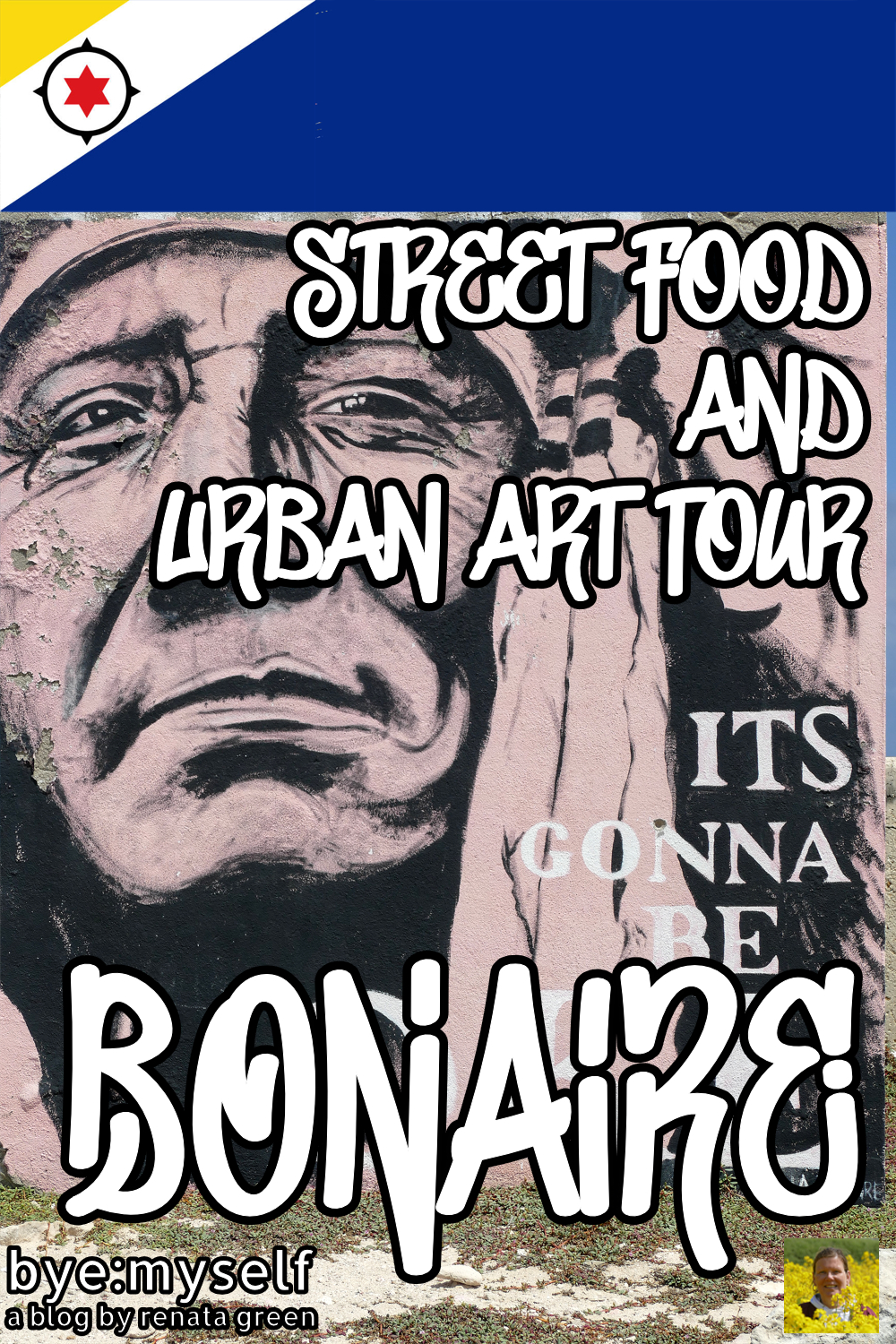
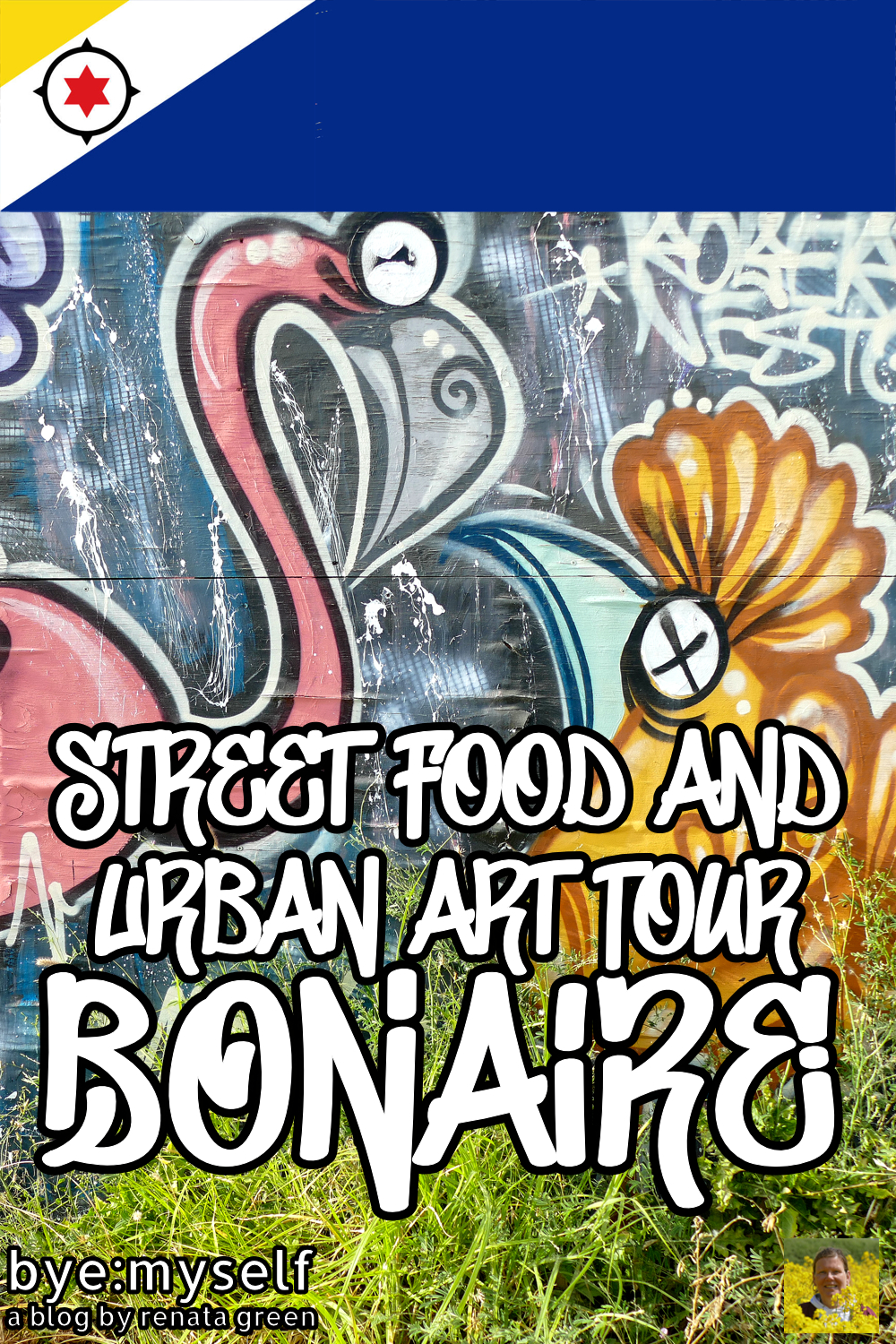
Did You Enjoy This Post? Then You Might Like Also These:
JIDAR Street Art Festival – How Rabat Celebrates International Urban Art
Guide to BOGOTÁ – Colombia’s hip ‘n’ artsy capital
ARUBA: The Powerful Murals of San Nicolas
Street Art in Rio de Janeiro: The Voice of Colors by Rita, Eduardo, and Jorge
A Visit to the Colonia Güell – Where Eusebi Güell Created His Universe
Two Days in MARSEILLE – What Not to Miss in the Belly of France
The Amazing Murals of the Hotel Ruins of Alyko
Best Street Art in VIENNA
Obviously, I am very appreciative that Greenbikes Bonaire invited me to try out their street art and street food tour in cooperation. Nevertheless, the description of these activities and all opinions on their services are mine and were in no way influenced by my cooperation partners.
* This is an affiliate link. If you book through this page, not only do you get the best deal. I also get a small commission that helps me run this blog. Thank you so much for supporting me!
